Inter-Process Communication Library
Data Structures | |
| struct | eripc_arg_t |
| struct | eripc_event_info_t |
| struct | eripc_client_context_t |
| struct | eripc_device_caps_t |
| struct | eripc_callback_function_t |
| struct | _osso_callback_data_t |
| struct | _osso_handler_t |
| struct | _osso_hash_value_t |
| struct | osso_af_context_t |
| struct | _eripc_context_t |
Files | |
| file | eripc.h |
Public header for liberipc. | |
| file | eripc_support.h |
Public header for liberipc support functions. | |
| file | init.h |
This file implements all initialisation and shutdown of the library. | |
| file | internal.h |
This file contains internal definitions. | |
Defines | |
| #define | DBUS_API_SUBJECT_TO_CHANGE |
| #define | OSSO_BUS_ROOT "com.irexnet" |
| #define | OSSO_BUS_ROOT_PATH "/com/irexnet" |
| #define | ERIPC_PATH_MATCH_ALL "eripc_path_match_all" |
| #define | ERIPC_MEMBER_MATCH_ALL "eripc_member_match_all" |
| #define | MAX_IF_LEN 255 |
| #define | MAX_SVC_LEN 255 |
| #define | MAX_OP_LEN 255 |
| #define | MAX_MEMBER_LEN 255 |
| #define | MAX_ERROR_LEN 255 |
| #define | MAX_HASH_KEY_LEN (MAX_IF_LEN + MAX_SVC_LEN + MAX_OP_LEN) |
| #define | MAX_OPM_HASH_KEY_LEN (MAX_OP_LEN + MAX_MEMBER_LEN) |
| #define | MAX_MSGID_LEN (MAX_SVC_LEN + 20 + 20 + 2) |
| #define | MAX_APP_NAME_LEN 50 |
| #define | MAX_VERSION_LEN 30 |
| #define | ERIPC_MAX_ARGS 256 |
| #define | ERIPC_MAX_MATCH_SIZE 256 |
| #define | dprint(f, a...) |
| #define | ULOG_CRIT(...) do {} while (0) |
| #define | ULOG_ERR(...) do {} while (0) |
| #define | ULOG_WARN(...) do {} while (0) |
| #define | ULOG_INFO(...) do {} while (0) |
| #define | ULOG_DEBUG(...) do {} while (0) |
| #define | ULOG_CRIT_L(...) do {} while (0) |
| #define | ULOG_ERR_L(...) do {} while (0) |
| #define | ULOG_WARN_L(...) do {} while (0) |
| #define | ULOG_INFO_L(...) do {} while (0) |
| #define | ULOG_DEBUG_L(...) do {} while (0) |
| #define | ULOG_CRIT_F(...) do {} while (0) |
| #define | ULOG_ERR_F(...) do {} while (0) |
| #define | ULOG_WARN_F(...) do {} while (0) |
| #define | ULOG_INFO_F(...) do {} while (0) |
| #define | ULOG_DEBUG_F(...) do {} while (0) |
| #define | DLOG_CRIT(...) do {} while (0) |
| #define | DLOG_ERR(...) do {} while (0) |
| #define | DLOG_WARN(...) do {} while (0) |
| #define | DLOG_INFO(...) do {} while (0) |
| #define | DLOG_DEBUG(...) do {} while (0) |
| #define | DLOG_CRIT_L(...) do {} while (0) |
| #define | DLOG_ERR_L(...) do {} while (0) |
| #define | DLOG_WARN_L(...) do {} while (0) |
| #define | DLOG_INFO_L(...) do {} while (0) |
| #define | DLOG_DEBUG_L(...) do {} while (0) |
| #define | DLOG_CRIT_F(...) do {} while (0) |
| #define | DLOG_ERR_F(...) do {} while (0) |
| #define | DLOG_WARN_F(...) do {} while (0) |
| #define | DLOG_INFO_F(...) do {} while (0) |
| #define | DLOG_DEBUG_F(...) do {} while (0) |
| #define | ULOG_OPEN(X) do {} while (0) |
| #define | DLOG_OPEN(X) do {} while (0) |
| #define | LOG_CLOSE() do {} while (0) |
Typedefs | |
| typedef struct _eripc_context_t | eripc_context_t |
| typedef void( | eripc_handler_t )(eripc_context_t *context, const eripc_event_info_t *info, void *user_data) |
| typedef struct osso_af_context_t | osso_context_t |
| typedef void( | _osso_handler_f )(osso_context_t *osso, DBusMessage *msg, _osso_callback_data_t *data, eripc_bus_t bus_type) |
| typedef struct osso_af_context_t | _eripc_context_t |
| typedef struct _eripc_context_t | _eripc_this_type_is_not_used_t |
Enumerations | |
| enum | eripc_error_t { ERIPC_ERROR_SUCCESS = 0, ERIPC_ERROR_INVALID, ERIPC_ERROR_OOM, ERIPC_ERROR, ERIPC_ERROR_TIMEOUT } |
| enum | eripc_data_t { ERIPC_TYPE_INVALID = 0, ERIPC_TYPE_BOOL, ERIPC_TYPE_BYTE, ERIPC_TYPE_INT, ERIPC_TYPE_UINT, ERIPC_TYPE_DOUBLE, ERIPC_TYPE_STRING, ERIPC_TYPE_DATA } |
| enum | eripc_bus_t { ERIPC_BUS_IRRELEVANT = 0, ERIPC_BUS_SYSTEM, ERIPC_BUS_SESSION, ERIPC_BUS_BOTH } |
| enum | eripc_event_t { ERIPC_EVENT_NONE = 0, ERIPC_EVENT_MESSAGE, ERIPC_EVENT_SIGNAL, ERIPC_EVENT_MESSAGE_OR_SIGNAL, ERIPC_EVENT_REPLY, ERIPC_EVENT_ERROR, ERIPC_EVENT_REPLY_OR_ERROR } |
Functions | |
| void * | eripc_get_system_connection (eripc_context_t *context) |
| void * | eripc_get_session_connection (eripc_context_t *context) |
| eripc_context_t * | eripc_init (const char *program_name, const char *program_version, GMainContext *context) |
| eripc_error_t | eripc_set_signal_handler (eripc_context_t *context, eripc_handler_t *handler, void *user_data, eripc_bus_t bus_type, const char *source, const char *signal_name, int *handler_id) |
| eripc_error_t | eripc_set_message_handler (eripc_context_t *context, eripc_handler_t *handler, void *user_data, eripc_bus_t bus_type, const char *source, const char *message_name, int *handler_id) |
| eripc_error_t | eripc_set_event_handler (eripc_context_t *context, const eripc_event_info_t *info, eripc_handler_t *handler, void *user_data, int *handler_id) |
| eripc_error_t | eripc_unset_handler (eripc_context_t *context, int handler_id) |
| eripc_error_t | eripc_get_timeout (eripc_context_t *context, int *timeout) |
| eripc_error_t | eripc_set_timeout (eripc_context_t *context, int timeout) |
| eripc_error_t | eripc_send_varargs (eripc_context_t *context, eripc_handler_t *reply_handler, const void *user_data, eripc_bus_t bus_type, const char *destination, const char *message_name, eripc_data_t arg_type,...) |
| eripc_error_t | eripc_send_string (eripc_context_t *context, eripc_handler_t *reply_handler, const void *user_data, eripc_bus_t bus_type, const char *destination, const char *message_name, const char *string) |
| eripc_error_t | eripc_send_int (eripc_context_t *context, eripc_handler_t *reply_handler, const void *user_data, eripc_bus_t bus_type, const char *destination, const char *message_name, int value) |
| eripc_error_t | eripc_send_bool (eripc_context_t *context, eripc_handler_t *reply_handler, const void *user_data, eripc_bus_t bus_type, const char *destination, const char *message_name, gboolean value) |
| eripc_error_t | eripc_send_varargs_and_wait (eripc_context_t *context, eripc_event_info_t **reply, eripc_bus_t bus_type, const char *destination, const char *message_name, eripc_data_t arg_type,...) |
| eripc_error_t | eripc_send_string_and_wait (eripc_context_t *context, eripc_event_info_t **reply, eripc_bus_t bus_type, const char *destination, const char *message_name, const char *string) |
| eripc_error_t | eripc_send_int_and_wait (eripc_context_t *context, eripc_event_info_t **reply, eripc_bus_t bus_type, const char *destination, const char *message_name, int value) |
| eripc_error_t | eripc_send_bool_and_wait (eripc_context_t *context, eripc_event_info_t **reply, eripc_bus_t bus_type, const char *destination, const char *message_name, gboolean value) |
| eripc_error_t | eripc_send_signal (eripc_context_t *context, eripc_bus_t bus_type, const char *signal_name, const char *argument) |
| eripc_error_t | eripc_send_signal_varargs (eripc_context_t *context, eripc_bus_t bus_type, const char *signal_path, const char *signal_interface, const char *signal_name, eripc_data_t arg_type,...) |
| eripc_error_t | eripc_event_info_free (eripc_context_t *context, eripc_event_info_t *reply) |
| eripc_error_t | eripc_reply_varargs (eripc_context_t *context, const char *message_id, eripc_data_t arg_type,...) |
| eripc_error_t | eripc_reply_string (eripc_context_t *context, const char *message_id, const char *string) |
| eripc_error_t | eripc_reply_int (eripc_context_t *context, const char *message_id, int value) |
| eripc_error_t | eripc_reply_bool (eripc_context_t *context, const char *message_id, gboolean value) |
| eripc_error_t | eripc_reply_error (eripc_context_t *context, const char *message_id, const char *error_name, const char *error_message) |
| eripc_client_context_t * | eripc_client_context_new (const char *name, const char *version, const char *service, const char *path, const char *interface, eripc_callback_function_t *callbacks) |
| void | eripc_client_context_free (eripc_client_context_t *ccontext, eripc_callback_function_t *callbacks) |
| const gchar * | eripc_error_string (eripc_error_t errorcode) |
| gboolean | eripc_menu_add_menu (eripc_client_context_t *ccontext, const char *name, const char *group1, const char *group2, const char *group3, const char *group4) |
| gboolean | eripc_menu_remove_menu (eripc_client_context_t *ccontext, const char *name) |
| gboolean | eripc_menu_add_group (eripc_client_context_t *ccontext, const char *name, const char *parent, const char *image) |
| gboolean | eripc_menu_add_item (eripc_client_context_t *ccontext, const char *name, const char *parent, const char *image) |
| gboolean | eripc_menu_set_menu_label (eripc_client_context_t *ccontext, const char *name, const char *label) |
| gboolean | eripc_menu_set_group_label (eripc_client_context_t *ccontext, const char *name, const char *label) |
| gboolean | eripc_menu_set_item_label (eripc_client_context_t *ccontext, const char *name, const char *parent, const char *label) |
| gboolean | eripc_menu_show_menu (eripc_client_context_t *ccontext, const char *name) |
| gboolean | eripc_menu_set_group_state (eripc_client_context_t *ccontext, const char *name, const char *state) |
| gboolean | eripc_menu_set_item_state (eripc_client_context_t *ccontext, const char *name, const char *parent, const char *state) |
| gboolean | eripc_menu_set_pagecounter (eripc_client_context_t *ccontext, int cur_page, int num_pages, gboolean boundary_check) |
| gboolean | eripc_menu_set_statusitem_state (eripc_client_context_t *ccontext, const char *item, const char *state) |
| gboolean | eripc_sysd_set_menu_state (eripc_client_context_t *ccontext, const char *state) |
| gboolean | eripc_sysd_mount_sd_card (eripc_client_context_t *ccontext, gboolean show_index_splash) |
| gboolean | eripc_sysd_unmount_sd_card (eripc_client_context_t *ccontext) |
| gboolean | eripc_sysd_set_busy (eripc_client_context_t *ccontext, const char *state, const char *message) |
| gboolean | eripc_sysd_reset_busy (eripc_client_context_t *ccontext) |
| gboolean | eripc_sysd_set_bg_busy (eripc_client_context_t *ccontext) |
| gboolean | eripc_sysd_reset_bg_busy (eripc_client_context_t *ccontext) |
| gboolean | eripc_sysd_set_keyboard (eripc_client_context_t *ccontext, const char *state) |
| gboolean | eripc_sysd_startup_complete (eripc_client_context_t *ccontext, const int pid, const gboolean is_multidoc, const int xid) |
| gint | eripc_sysd_start_task (eripc_client_context_t *ccontext, const gchar *cmd_line, const gchar *work_dir, const gchar *label, const gchar *thumbnail_path, gchar **err_message) |
| gboolean | eripc_sysd_stop_task (eripc_client_context_t *ccontext, const char *cmd_line) |
| gint | eripc_sysd_open_url (eripc_client_context_t *ccontext, const gchar *url, const gchar *label, const gchar *back_text, gchar **err_message) |
| gboolean | eripc_sysd_get_device_capabilities (eripc_client_context_t *ccontext, eripc_device_caps_t *caps) |
| gboolean | eripc_sysd_conn_connect (eripc_client_context_t *ccontext, const char *medium, const char *profile) |
| gboolean | eripc_sysd_conn_disconnect (eripc_client_context_t *ccontext) |
| gboolean | eripc_sysd_conn_status_request (eripc_client_context_t *ccontext) |
| static gboolean | _validate (const gchar *application, const gchar *version) |
| static osso_context_t * | _init (const char *application, const char *version) |
| static void | _deinit (osso_context_t *osso) |
| static DBusConnection * | _dbus_setup (osso_context_t *osso, DBusBusType bus_type, GMainContext *context) |
| int | __attribute__ ((visibility("hidden"))) eripc_convert_msgtype(int t) |
| eripc_arg_t * | _get_args (DBusMessageIter *iter) |
| gboolean | validate_appname (const gchar *application) |
Variables | |
| DBusHandlerResult DBusMessage * | msg |
| DBusHandlerResult DBusMessage void * | data |
| void char * | interface |
| void char * | service |
| void char * | path |
| void const char * | name |
| void const char char * | ready_name |
| gboolean _osso_handler_f * | handler |
| gboolean _osso_handler_f _osso_callback_data_t int | handler_id |
| gboolean _osso_handler_f _osso_callback_data_t int gboolean | call_once_per_handler_id |
| void eripc_bus_t * | bus |
| void eripc_bus_t char * | sender |
| void eripc_bus_t char int * | serial |
| void const char int char * | id |
Define Documentation
| #define DBUS_API_SUBJECT_TO_CHANGE |
Copyright (C) 2008 iRex Technologies B.V. All rights reserved.
Based on code found in libosso library by Kimmo Hämäläinen <kimmo.hamalainen@nokia.com>
Definition at line 35 of file internal.h.
| #define DLOG_CRIT | ( | ... | ) | do {} while (0) |
Definition at line 277 of file eripc/include/log.h.
| #define DLOG_CRIT_F | ( | ... | ) | do {} while (0) |
Definition at line 287 of file eripc/include/log.h.
| #define DLOG_CRIT_L | ( | ... | ) | do {} while (0) |
Definition at line 282 of file eripc/include/log.h.
| #define DLOG_DEBUG | ( | ... | ) | do {} while (0) |
Definition at line 281 of file eripc/include/log.h.
| #define DLOG_DEBUG_F | ( | ... | ) | do {} while (0) |
Definition at line 291 of file eripc/include/log.h.
| #define DLOG_DEBUG_L | ( | ... | ) | do {} while (0) |
Definition at line 286 of file eripc/include/log.h.
| #define DLOG_ERR | ( | ... | ) | do {} while (0) |
Definition at line 278 of file eripc/include/log.h.
| #define DLOG_ERR_F | ( | ... | ) | do {} while (0) |
Definition at line 288 of file eripc/include/log.h.
| #define DLOG_ERR_L | ( | ... | ) | do {} while (0) |
Definition at line 283 of file eripc/include/log.h.
| #define DLOG_INFO | ( | ... | ) | do {} while (0) |
Definition at line 280 of file eripc/include/log.h.
| #define DLOG_INFO_F | ( | ... | ) | do {} while (0) |
Definition at line 290 of file eripc/include/log.h.
| #define DLOG_INFO_L | ( | ... | ) | do {} while (0) |
Definition at line 285 of file eripc/include/log.h.
| #define DLOG_OPEN | ( | X | ) | do {} while (0) |
Definition at line 294 of file eripc/include/log.h.
| #define DLOG_WARN | ( | ... | ) | do {} while (0) |
Definition at line 279 of file eripc/include/log.h.
| #define DLOG_WARN_F | ( | ... | ) | do {} while (0) |
Definition at line 289 of file eripc/include/log.h.
| #define DLOG_WARN_L | ( | ... | ) | do {} while (0) |
Definition at line 284 of file eripc/include/log.h.
| #define dprint | ( | f, | |||
| a... | ) |
Definition at line 174 of file internal.h.
Referenced by _dbus_setup().
| #define ERIPC_MAX_ARGS 256 |
Definition at line 71 of file internal.h.
Referenced by _get_args().
| #define ERIPC_MAX_MATCH_SIZE 256 |
Definition at line 72 of file internal.h.
Referenced by compose_match().
| #define ERIPC_MEMBER_MATCH_ALL "eripc_member_match_all" |
Definition at line 56 of file internal.h.
Referenced by __attribute__(), _send_helper(), compose_opm_hash_key(), and opm_match().
| #define ERIPC_PATH_MATCH_ALL "eripc_path_match_all" |
Definition at line 55 of file internal.h.
Referenced by __attribute__(), _send_helper(), compose_opm_hash_key(), and opm_match().
| #define LOG_CLOSE | ( | ) | do {} while (0) |
Definition at line 295 of file eripc/include/log.h.
| #define MAX_APP_NAME_LEN 50 |
Definition at line 68 of file internal.h.
Referenced by _init().
| #define MAX_ERROR_LEN 255 |
Definition at line 63 of file internal.h.
Referenced by eripc_reply_error().
| #define MAX_HASH_KEY_LEN (MAX_IF_LEN + MAX_SVC_LEN + MAX_OP_LEN) |
Definition at line 64 of file internal.h.
| #define MAX_IF_LEN 255 |
Definition at line 59 of file internal.h.
Referenced by __attribute__(), _send_helper(), and _send_sync_helper().
| #define MAX_MEMBER_LEN 255 |
Definition at line 62 of file internal.h.
Referenced by compose_opm_hash_key(), and opm_match_helper().
| #define MAX_MSGID_LEN (MAX_SVC_LEN + 20 + 20 + 2) |
Definition at line 66 of file internal.h.
Referenced by _make_id(), _send_sync_helper(), eripc_reply_handler(), and generic_signal_handler().
| #define MAX_OP_LEN 255 |
Definition at line 61 of file internal.h.
Referenced by _send_helper(), _send_sync_helper(), compose_opm_hash_key(), and opm_match_helper().
| #define MAX_OPM_HASH_KEY_LEN (MAX_OP_LEN + MAX_MEMBER_LEN) |
Definition at line 65 of file internal.h.
Referenced by __attribute__(), and opm_match().
| #define MAX_SVC_LEN 255 |
Definition at line 60 of file internal.h.
Referenced by _parse_id(), _reply_helper(), _send_helper(), _send_sync_helper(), and eripc_reply_error().
| #define MAX_VERSION_LEN 30 |
Definition at line 69 of file internal.h.
Referenced by _init().
| #define OSSO_BUS_ROOT "com.irexnet" |
Definition at line 52 of file internal.h.
Referenced by __attribute__().
| #define OSSO_BUS_ROOT_PATH "/com/irexnet" |
Definition at line 53 of file internal.h.
| #define ULOG_CRIT | ( | ... | ) | do {} while (0) |
Copyright (C) 2008 iRex Technologies B.V. All rights reserved.
Based on code found in libosso library by Kimmo Hämäläinen <kimmo.hamalainen@nokia.com>
Definition at line 261 of file eripc/include/log.h.
| #define ULOG_CRIT_F | ( | ... | ) | do {} while (0) |
Definition at line 271 of file eripc/include/log.h.
Referenced by eripc_init(), and fix_name().
| #define ULOG_CRIT_L | ( | ... | ) | do {} while (0) |
Definition at line 266 of file eripc/include/log.h.
| #define ULOG_DEBUG | ( | ... | ) | do {} while (0) |
Definition at line 265 of file eripc/include/log.h.
| #define ULOG_DEBUG_F | ( | ... | ) | do {} while (0) |
Definition at line 275 of file eripc/include/log.h.
Referenced by __attribute__(), _filter(), eripc_client_context_new(), eripc_init(), eripc_set_event_handler(), eripc_unset_handler(), generic_signal_handler(), parse_reply_capabilities(), parse_reply_start(), and remove_from_opm_hash().
| #define ULOG_DEBUG_L | ( | ... | ) | do {} while (0) |
Definition at line 270 of file eripc/include/log.h.
| #define ULOG_ERR | ( | ... | ) | do {} while (0) |
Definition at line 262 of file eripc/include/log.h.
Referenced by eripc_client_context_new().
| #define ULOG_ERR_F | ( | ... | ) | do {} while (0) |
Definition at line 272 of file eripc/include/log.h.
Referenced by __attribute__(), _append_args(), _dbus_setup(), _get_args(), _init(), _reply_helper(), _send_helper(), _send_signal_helper(), _send_sync_helper(), _set_handler(), _validate(), add_to_opm_hash(), eripc_convert_msgtype(), eripc_reply_error(), eripc_set_event_handler(), and eripc_unset_handler().
| #define ULOG_ERR_L | ( | ... | ) | do {} while (0) |
Definition at line 267 of file eripc/include/log.h.
| #define ULOG_INFO | ( | ... | ) | do {} while (0) |
Definition at line 264 of file eripc/include/log.h.
| #define ULOG_INFO_F | ( | ... | ) | do {} while (0) |
Definition at line 274 of file eripc/include/log.h.
| #define ULOG_INFO_L | ( | ... | ) | do {} while (0) |
Definition at line 269 of file eripc/include/log.h.
| #define ULOG_OPEN | ( | X | ) | do {} while (0) |
Definition at line 293 of file eripc/include/log.h.
| #define ULOG_WARN | ( | ... | ) | do {} while (0) |
Definition at line 263 of file eripc/include/log.h.
| #define ULOG_WARN_F | ( | ... | ) | do {} while (0) |
Definition at line 273 of file eripc/include/log.h.
Referenced by __attribute__(), eripc_reply_handler(), and generic_signal_handler().
| #define ULOG_WARN_L | ( | ... | ) | do {} while (0) |
Definition at line 268 of file eripc/include/log.h.
Typedef Documentation
| typedef struct osso_af_context_t _eripc_context_t |
This structure is used to store library specific stuff
| typedef struct _eripc_context_t _eripc_this_type_is_not_used_t |
| typedef void( _osso_handler_f)(osso_context_t *osso, DBusMessage *msg, _osso_callback_data_t *data, eripc_bus_t bus_type) |
Definition at line 92 of file internal.h.
| typedef struct _eripc_context_t eripc_context_t |
| typedef void( eripc_handler_t)(eripc_context_t *context, const eripc_event_info_t *info, void *user_data) |
This is the type for the callback handlers of events and messages.
This function is called when the asynchronous function returns a reply or when a registered event occurs.
- Parameters:
-
context IPC context returned by eripc_init. info Structure specifying the type of event and its arguments. user_data Optional user data passed when the handler was registered.
| typedef struct osso_af_context_t osso_context_t |
Enumeration Type Documentation
| enum eripc_bus_t |
Definition at line 58 of file eripc.h.
00058 { 00059 ERIPC_BUS_IRRELEVANT = 0, 00060 ERIPC_BUS_SYSTEM, 00061 ERIPC_BUS_SESSION, 00062 ERIPC_BUS_BOTH 00063 } eripc_bus_t;
| enum eripc_data_t |
- Enumerator:
ERIPC_TYPE_INVALID ERIPC_TYPE_BOOL ERIPC_TYPE_BYTE ERIPC_TYPE_INT ERIPC_TYPE_UINT ERIPC_TYPE_DOUBLE ERIPC_TYPE_STRING ERIPC_TYPE_DATA
Definition at line 47 of file eripc.h.
00047 { 00048 ERIPC_TYPE_INVALID = 0, 00049 ERIPC_TYPE_BOOL, 00050 ERIPC_TYPE_BYTE, 00051 ERIPC_TYPE_INT, 00052 ERIPC_TYPE_UINT, 00053 ERIPC_TYPE_DOUBLE, 00054 ERIPC_TYPE_STRING, 00055 ERIPC_TYPE_DATA 00056 } eripc_data_t;
| enum eripc_error_t |
Copyright (C) 2008 iRex Technologies B.V. All rights reserved.
Based on code found in libosso library by Kimmo Hämäläinen <kimmo.hamalainen@nokia.com>
Definition at line 39 of file eripc.h.
00039 { 00040 ERIPC_ERROR_SUCCESS = 0, /* success (not an error) */ 00041 ERIPC_ERROR_INVALID, /* invalid arguments */ 00042 ERIPC_ERROR_OOM, /* out of memory */ 00043 ERIPC_ERROR, /* generic error code */ 00044 ERIPC_ERROR_TIMEOUT, /* timeout happened */ 00045 } eripc_error_t;
| enum eripc_event_t |
- Enumerator:
ERIPC_EVENT_NONE ERIPC_EVENT_MESSAGE ERIPC_EVENT_SIGNAL ERIPC_EVENT_MESSAGE_OR_SIGNAL ERIPC_EVENT_REPLY ERIPC_EVENT_ERROR ERIPC_EVENT_REPLY_OR_ERROR
Definition at line 65 of file eripc.h.
00065 { 00066 ERIPC_EVENT_NONE = 0, /* non-event, event type is not relevant */ 00067 ERIPC_EVENT_MESSAGE, /* message received */ 00068 ERIPC_EVENT_SIGNAL, /* signal received */ 00069 ERIPC_EVENT_MESSAGE_OR_SIGNAL, /* message or signal received */ 00070 ERIPC_EVENT_REPLY, /* reply received */ 00071 ERIPC_EVENT_ERROR, /* error reply received */ 00072 ERIPC_EVENT_REPLY_OR_ERROR, /* reply or error received */ 00073 } eripc_event_t;
Function Documentation
| gboolean __attribute__ | ( | (visibility("hidden")) | ) |
Definition at line 145 of file init.c.
References MAX_IF_LEN, and OSSO_BUS_ROOT.
00147 { 00148 assert(application != NULL); 00149 assert(interface != NULL); 00150 00151 if (g_strrstr(application, ".") != NULL) { 00152 g_snprintf(interface, MAX_IF_LEN, "%s", application); 00153 } else { 00154 g_snprintf(interface, MAX_IF_LEN, OSSO_BUS_ROOT ".%s", 00155 application); 00156 } 00157 }
| static DBusConnection* _dbus_setup | ( | osso_context_t * | osso, | |
| DBusBusType | bus_type, | |||
| GMainContext * | context | |||
| ) | [static] |
This function connect to the given D-BUS bus and registers itself with the D-BUS daemon.
- Parameters:
-
osso The osso_context_t for this connection. bus_type. The DBusType to use. context The GLib main-loop context to connect to, use NULL for the default context.
- Returns:
- The DBusConnection for the connection.
| static void _deinit | ( | osso_context_t * | osso | ) | [static] |
This function deinitializes the osso_type_t structure, but does not touch and D-BUS element. As a final thing it will destroy the osso_context_t structure.
- Parameters:
-
osso the disconnecte osso_context_t structure to destroy.
| eripc_arg_t* _get_args | ( | DBusMessageIter * | iter | ) |
Definition at line 62 of file hw.c.
References _get_byte_array(), eripc_arg_t::b, eripc_arg_t::by, eripc_arg_t::d, ERIPC_MAX_ARGS, ERIPC_TYPE_BOOL, ERIPC_TYPE_BYTE, ERIPC_TYPE_DOUBLE, ERIPC_TYPE_INT, ERIPC_TYPE_INVALID, ERIPC_TYPE_STRING, ERIPC_TYPE_UINT, eripc_arg_t::i, eripc_arg_t::s, eripc_arg_t::type, eripc_arg_t::u, ULOG_ERR_F, and eripc_arg_t::value.
Referenced by _send_sync_helper(), eripc_reply_handler(), and generic_signal_handler().
00063 { 00064 int type, idx = 0; 00065 eripc_arg_t *arg_array; 00066 00067 arg_array = calloc(1, sizeof(eripc_arg_t) * (ERIPC_MAX_ARGS + 1)); 00068 if (arg_array == NULL) { 00069 ULOG_ERR_F("calloc() failed: %s", strerror(errno)); 00070 return NULL; 00071 } 00072 00073 while ((type = dbus_message_iter_get_arg_type(iter)) 00074 != DBUS_TYPE_INVALID) { 00075 00076 int i; 00077 unsigned int u; 00078 double d; 00079 char c, *s; 00080 00081 switch (type) { 00082 case DBUS_TYPE_BOOLEAN: 00083 arg_array[idx].type = ERIPC_TYPE_BOOL; 00084 dbus_message_iter_get_basic(iter, &i); 00085 arg_array[idx].value.b = i ? 1 : 0; 00086 ++idx; 00087 break; 00088 case DBUS_TYPE_INT32: 00089 arg_array[idx].type = ERIPC_TYPE_INT; 00090 dbus_message_iter_get_basic(iter, &i); 00091 arg_array[idx].value.i = i; 00092 ++idx; 00093 break; 00094 case DBUS_TYPE_UINT32: 00095 arg_array[idx].type = ERIPC_TYPE_UINT; 00096 dbus_message_iter_get_basic(iter, &u); 00097 arg_array[idx].value.u = u; 00098 ++idx; 00099 break; 00100 case DBUS_TYPE_DOUBLE: 00101 arg_array[idx].type = ERIPC_TYPE_DOUBLE; 00102 dbus_message_iter_get_basic(iter, &d); 00103 arg_array[idx].value.d = d; 00104 ++idx; 00105 break; 00106 case DBUS_TYPE_BYTE: 00107 arg_array[idx].type = ERIPC_TYPE_BYTE; 00108 dbus_message_iter_get_basic(iter, &c); 00109 arg_array[idx].value.by = c; 00110 ++idx; 00111 break; 00112 case DBUS_TYPE_STRING: 00113 arg_array[idx].type = ERIPC_TYPE_STRING; 00114 dbus_message_iter_get_basic(iter, &s); 00115 arg_array[idx].value.s = s; 00116 ++idx; 00117 break; 00118 case DBUS_TYPE_ARRAY: 00119 /* only byte arrays are supported */ 00120 if (dbus_message_iter_get_element_type(iter) 00121 == DBUS_TYPE_BYTE) { 00122 _get_byte_array(iter, 00123 &arg_array[idx]); 00124 ++idx; 00125 } else { 00126 ULOG_ERR_F("arrays of type %d not" 00127 " supported", 00128 dbus_message_iter_get_element_type(iter)); 00129 } 00130 break; 00131 default: 00132 ULOG_ERR_F("type %d not supported", type); 00133 break; 00134 } 00135 00136 dbus_message_iter_next(iter); 00137 } 00138 00139 arg_array[idx].type = ERIPC_TYPE_INVALID; 00140 00141 return arg_array; 00142 }

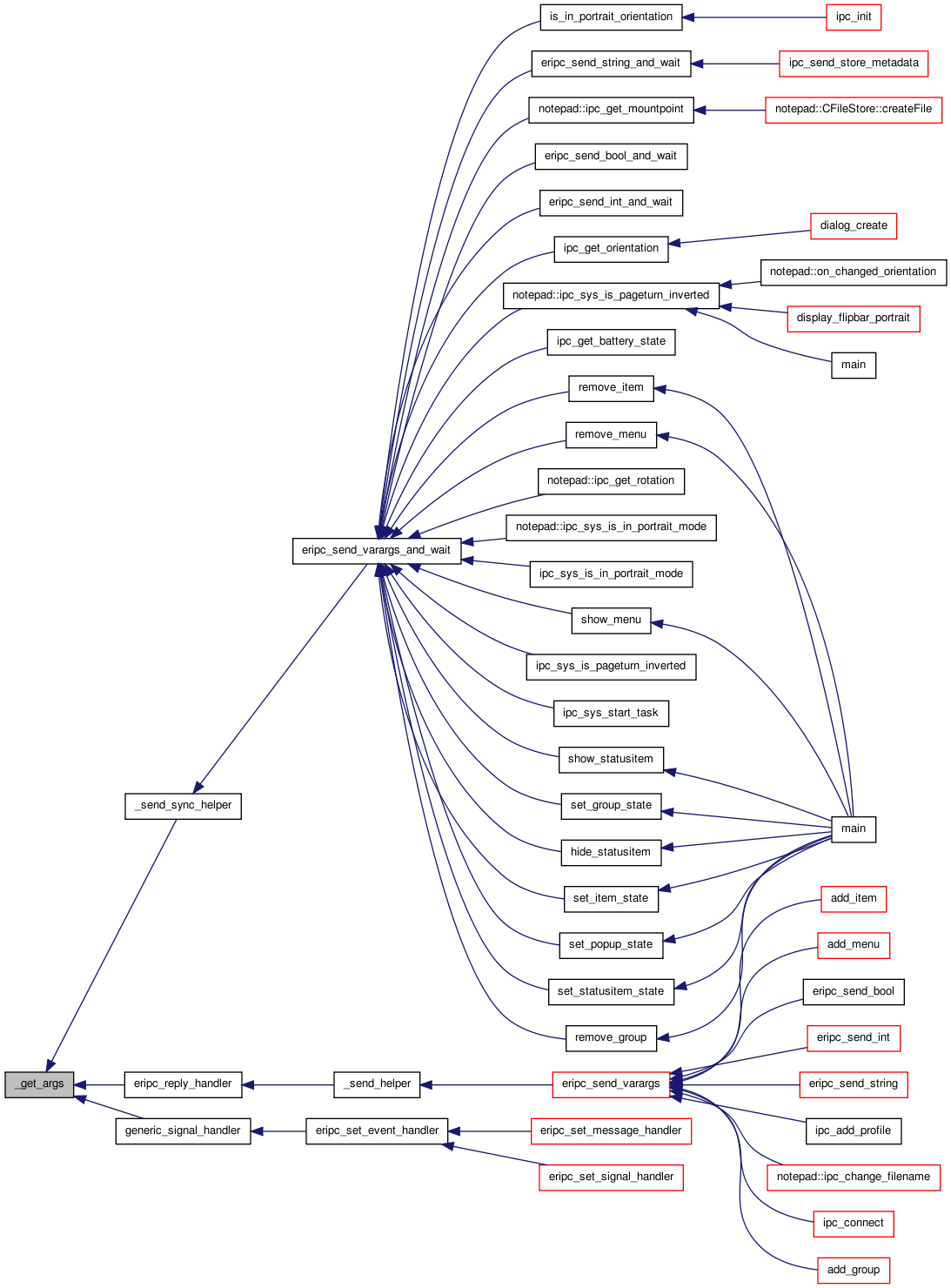
| static osso_context_t* _init | ( | const char * | application, | |
| const char * | version | |||
| ) | [static] |
This function allocates and initializes the osso_type_t structure
- Parameters:
-
application The application name verson The application version.
- Returns:
- the newly allocated osso_context_t structure, or NULL if there is an error.
| static gboolean _validate | ( | const gchar * | application, | |
| const gchar * | version | |||
| ) | [static] |
Copyright (C) 2008 iRex Technologies B.V. All rights reserved.
Based on code found in libosso library by Kimmo Hämäläinen <kimmo.hamalainen@nokia.com> This internal function performs a simple validation for the application and version information of the osso_context regarding their validity as components of the filesystem (no slashes, value not NULL etc)
- Parameters:
-
application The application name verson The application version.
- Returns:
- TRUE if the context passes the validation, FALSE otherwise.
| void eripc_client_context_free | ( | eripc_client_context_t * | ccontext, | |
| eripc_callback_function_t * | callbacks | |||
| ) |
Free a client context
Definition at line 269 of file support.c.
References eripc_client_context_t::context, eripc_unset_handler(), eripc_callback_function_t::handler_id, eripc_client_context_t::name, eripc_client_context_t::path, and eripc_client_context_t::service.
Referenced by notepad::ipc_unset_services(), and ipc_unset_services().
00271 { 00272 if (callbacks != NULL) 00273 { 00274 for (int i = 0 ; callbacks[i].handler_id != 0 ; i++) 00275 { 00276 eripc_unset_handler(ccontext->context, callbacks[i].handler_id); 00277 } 00278 } 00279 00280 if (ccontext) 00281 { 00282 free(ccontext->name); 00283 free(ccontext->service); 00284 free(ccontext->path); 00285 free(ccontext); 00286 } 00287 }


| eripc_client_context_t* eripc_client_context_new | ( | const char * | name, | |
| const char * | version, | |||
| const char * | service, | |||
| const char * | path, | |||
| const char * | interface, | |||
| eripc_callback_function_t * | callbacks | |||
| ) |
Create a new client context for a client application
Definition at line 189 of file support.c.
References eripc_client_context_t::context, ERIPC_BUS_SESSION, ERIPC_ERROR_SUCCESS, eripc_init(), eripc_set_message_handler(), eripc_set_signal_handler(), fix_name(), eripc_callback_function_t::handler, eripc_callback_function_t::handler_id, interface, eripc_callback_function_t::message_name, eripc_client_context_t::name, name, eripc_client_context_t::path, path, eripc_client_context_t::service, service, ULOG_DEBUG_F, and ULOG_ERR.
Referenced by ipc_init(), notepad::ipc_set_services(), ipc_set_services(), and main().
00195 { 00196 int retval; 00197 eripc_client_context_t* ccontext; 00198 00199 ccontext = (eripc_client_context_t*)malloc(sizeof(eripc_client_context_t)); 00200 00201 char *name = fix_name(raw_name); 00202 char *service = fix_name(raw_service); 00203 char *path = fix_name(raw_path); 00204 char *interface = fix_name(raw_interface); 00205 00206 ccontext->context = eripc_init(name, version, NULL); 00207 if (ccontext->context == NULL) 00208 { 00209 // NOTE: MEMLEAK on name, service, path and interface! 00210 ULOG_ERR("Failed to initialize eripc context"); 00211 free(ccontext); 00212 return NULL; 00213 } 00214 00215 if (callbacks != NULL) 00216 { 00217 for (int i = 0 ; callbacks[i].handler != NULL ; i++) 00218 { 00219 if (callbacks[i].interface) 00220 { 00221 // install signal handler 00222 char *cb_interface = fix_name(callbacks[i].interface); 00223 retval = eripc_set_signal_handler( ccontext->context, 00224 callbacks[i].handler, 00225 NULL, 00226 ERIPC_BUS_SESSION, 00227 cb_interface, 00228 callbacks[i].message_name, 00229 &(callbacks[i].handler_id) ); 00230 00231 free(cb_interface); 00232 if (retval != ERIPC_ERROR_SUCCESS) 00233 { 00234 ULOG_DEBUG_F( "eripc_set_signal_handler %s returns %d", 00235 callbacks[i].message_name, 00236 retval ); 00237 } 00238 } 00239 else 00240 { 00241 // install message handler 00242 retval = eripc_set_message_handler( ccontext->context, 00243 callbacks[i].handler, 00244 NULL, 00245 ERIPC_BUS_SESSION, 00246 interface, 00247 callbacks[i].message_name, 00248 &(callbacks[i].handler_id) ); 00249 00250 if (retval != ERIPC_ERROR_SUCCESS) 00251 { 00252 ULOG_DEBUG_F( "eripc_set_message_handler %s returns %d", 00253 callbacks[i].message_name, 00254 retval ); 00255 } 00256 } 00257 } 00258 } 00259 00260 free(interface); 00261 00262 ccontext->name = name; 00263 ccontext->service = service; 00264 ccontext->path = path; 00265 return ccontext; 00266 }
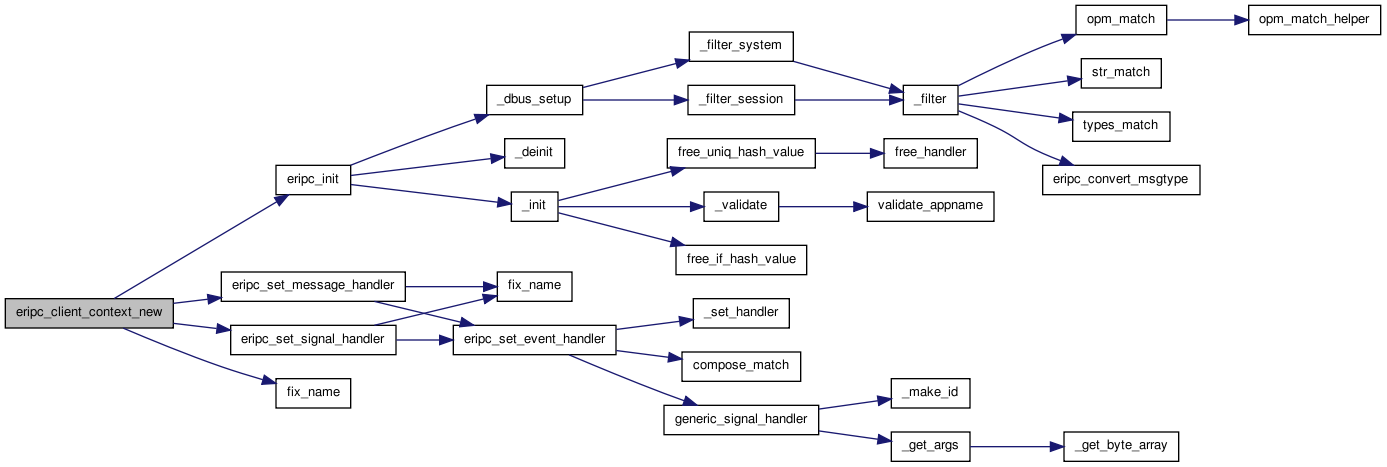
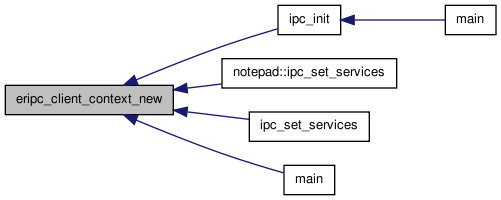
| const gchar* eripc_error_string | ( | eripc_error_t | errorcode | ) |
Return error string for code
Definition at line 290 of file support.c.
References ERIPC_ERROR, ERIPC_ERROR_INVALID, ERIPC_ERROR_OOM, ERIPC_ERROR_SUCCESS, and ERIPC_ERROR_TIMEOUT.
Referenced by cb_sys_get_battery_state(), cb_sys_get_card_mountpoint(), cb_sys_get_device_capabilities(), cb_sys_get_orientation(), cb_sys_get_pageturn_inverted(), cb_sys_get_stylus(), ipc_add_profile(), ipc_confirm_install_drz(), ipc_confirm_install_update(), ipc_confirm_usbconnect(), ipc_connect(), ipc_ctb_goto(), ipc_disconnect(), ipc_edit_profile(), ipc_get_battery_state(), ipc_menu_add_task(), ipc_menu_remove_task(), ipc_menu_rename_task(), ipc_menu_set_first_task(), ipc_send_close(), ipc_send_conn_status(), ipc_send_item_activated(), ipc_send_open(), ipc_send_page_change(), ipc_send_ping(), ipc_send_reply(), ipc_send_reply_task_start(), ipc_send_status_item_activated(), ipc_send_store_metadata(), ipc_send_task_activated(), ipc_send_volume_mounted_to(), ipc_send_window_activated(), ipc_send_window_deactivated(), ipc_send_window_show(), ipc_set_orientation(), ipc_show_busy(), ipc_show_message(), ipc_show_popup(), and ipc_show_splash().
00291 { 00292 switch (errorcode) 00293 { 00294 case ERIPC_ERROR_SUCCESS: 00295 return "No error (ERIPC_ERROR_SUCCESS)"; 00296 case ERIPC_ERROR: 00297 return "Some kind of error occurred (ERIPC_ERROR)"; 00298 case ERIPC_ERROR_INVALID: 00299 return "At least one parameter is invalid (ERIPC_ERROR_INVALID)"; 00300 case ERIPC_ERROR_OOM: 00301 return "Out of memory error (ERIPC_ERROR_OOM)"; 00302 case ERIPC_ERROR_TIMEOUT: 00303 return "Timeout error (ERIPC_ERROR_TIMEOUT)"; 00304 default: 00305 return "Unknown/Undefined"; 00306 } 00307 }

| eripc_error_t eripc_event_info_free | ( | eripc_context_t * | context, | |
| eripc_event_info_t * | reply | |||
| ) |
This function frees the event info structure and associated message.
- Parameters:
-
context IPC context returned by eripc_init. reply A pointer to the event info structure where the return info is stored.
- Returns:
- ERIPC_ERROR_SUCCESS on success.
Definition at line 743 of file rpc.c.
References eripc_event_info_t::args, eripc_event_info_t::dbus_message, ERIPC_ERROR_SUCCESS, and UNUSED.
Referenced by ipc_get_battery_state(), notepad::ipc_get_mountpoint(), ipc_get_orientation(), notepad::ipc_sys_is_in_portrait_mode(), ipc_sys_is_in_portrait_mode(), notepad::ipc_sys_is_pageturn_inverted(), ipc_sys_is_pageturn_inverted(), and is_in_portrait_orientation().
00745 { 00746 UNUSED(context); 00747 if (info != NULL) { 00748 if (info->args != NULL) { 00749 free((char*)info->args); 00750 } 00751 00752 if (info->dbus_message != NULL) { 00753 dbus_message_unref((DBusMessage *)info->dbus_message); 00754 } 00755 00756 free(info); 00757 } 00758 00759 return ERIPC_ERROR_SUCCESS; 00760 }

| void* eripc_get_session_connection | ( | eripc_context_t * | context | ) |
Definition at line 163 of file rpc.c.
References _eripc_context_t::conn.
00164 { 00165 return (void *) context->conn; 00166 }
| void* eripc_get_system_connection | ( | eripc_context_t * | context | ) |
Definition at line 158 of file rpc.c.
References _eripc_context_t::sys_conn.
Referenced by hal_set_services().
00159 { 00160 return (void *) context->sys_conn; 00161 }

| eripc_error_t eripc_get_timeout | ( | eripc_context_t * | context, | |
| int * | timeout | |||
| ) |
Returns the current RPC timeout value.
- Parameters:
-
context IPC context returned by eripc_init. timeout A pointer where to return the timeout value in milliseconds.
- Returns:
- ERIPC_ERROR_SUCCESS on success.
Definition at line 150 of file rpc.c.
References ERIPC_ERROR_INVALID, ERIPC_ERROR_SUCCESS, and _eripc_context_t::timeout_ms.
Referenced by eripc_sysd_get_device_capabilities(), and ipc_sys_start_task().
00151 { 00152 if(context == NULL) return ERIPC_ERROR_INVALID; 00153 *timeout = context->timeout_ms; 00154 return ERIPC_ERROR_SUCCESS; 00155 }

| eripc_context_t* eripc_init | ( | const char * | program_name, | |
| const char * | program_version, | |||
| GMainContext * | context | |||
| ) |
This function initialises the library, connects to both the D-Bus session and system busses, integrates with the GLib main loop, and initialises the library for use. eripc_init should be called only once by the program.
- Parameters:
-
program_name The name of the program. This name forms the last part of the default (D-Bus) service name of the program. Note that the D-Bus service name will be 'com.irexnet.program_name', where 'program_name' is the value you gave as the parameter. The only valid characters that the name may contain are letters a-z and the underscore '_'. However, you can give a name such as 'org.foo.bar' to have 'bar' as your program's name and 'org.foo.bar' as the D-Bus service name. program_version The version string of the application. This will be used to determine if a saved UI state is still valid for the program. context The GLib main loop context to connect to, or NULL for the default context.
- Returns:
- A context to use in later calls to this library, or NULL if an error happened.
Definition at line 81 of file init.c.
References _dbus_setup(), _deinit(), _init(), osso_af_context_t::conn, osso_af_context_t::cur_conn, osso_af_context_t::eripc_filters_setup, name, osso_af_context_t::sys_conn, ULOG_CRIT_F, and ULOG_DEBUG_F.
Referenced by eripc_client_context_new(), ipc_set_services(), and main().
00084 { 00085 osso_context_t *osso; 00086 00087 char *name = strdup(program_name); 00088 if (name == NULL) { 00089 ULOG_CRIT_F("initialisation failed: out of memory"); 00090 return NULL; 00091 } 00092 00093 // replace dashes (-) with underscores (_) as dbus chokes on dashes 00094 unsigned int i; 00095 for (i=0; i<strlen(name); i++) 00096 { 00097 if (name[i] == '-') 00098 name[i] = '_'; 00099 } 00100 00101 ULOG_DEBUG_F("program '%s', version '%s'", name, 00102 program_version); 00103 00104 osso = _init(name, program_version); 00105 free(name); 00106 if (osso == NULL) { 00107 ULOG_CRIT_F("initialisation failed: out of memory"); 00108 return NULL; 00109 } 00110 00111 osso->conn = _dbus_setup(osso, DBUS_BUS_SESSION, context); 00112 if (osso->conn == NULL) { 00113 ULOG_CRIT_F("connecting to the session bus failed"); 00114 _deinit(osso); 00115 return NULL; 00116 } 00117 osso->sys_conn = _dbus_setup(osso, DBUS_BUS_SYSTEM, context); 00118 if (osso->sys_conn == NULL) { 00119 ULOG_CRIT_F("connecting to the system bus failed"); 00120 _deinit(osso); 00121 return NULL; 00122 } 00123 osso->eripc_filters_setup = TRUE; 00124 osso->cur_conn = NULL; 00125 return (eripc_context_t*)osso; 00126 }

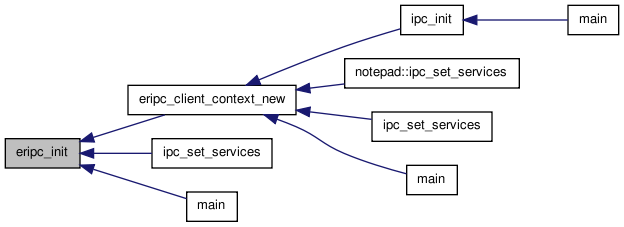
| gboolean eripc_menu_add_group | ( | eripc_client_context_t * | ccontext, | |
| const char * | name, | |||
| const char * | parent, | |||
| const char * | image | |||
| ) |
Add a new group to a popupmenu menu
Definition at line 340 of file support.c.
References DBUS_SERVICE_POPUP_MENU, ERIPC_TYPE_INVALID, ERIPC_TYPE_STRING, and MAKE_VARARG_CALL.
Referenced by ipc_menu_add_group(), and notepad::menu_init().
00344 { 00345 MAKE_VARARG_CALL(DBUS_SERVICE_POPUP_MENU, "addGroup", 00346 ERIPC_TYPE_STRING, name, 00347 ERIPC_TYPE_STRING, parent, 00348 ERIPC_TYPE_STRING, "", 00349 ERIPC_TYPE_STRING, image, 00350 ERIPC_TYPE_INVALID ); 00351 }

| gboolean eripc_menu_add_item | ( | eripc_client_context_t * | ccontext, | |
| const char * | name, | |||
| const char * | parent, | |||
| const char * | image | |||
| ) |
Add a new item to a popupmenu group
Definition at line 354 of file support.c.
References DBUS_SERVICE_POPUP_MENU, ERIPC_TYPE_INVALID, ERIPC_TYPE_STRING, and MAKE_VARARG_CALL.
Referenced by ipc_menu_add_item(), and notepad::menu_init().
00358 { 00359 MAKE_VARARG_CALL(DBUS_SERVICE_POPUP_MENU, "addItem", 00360 ERIPC_TYPE_STRING, name, 00361 ERIPC_TYPE_STRING, parent, 00362 ERIPC_TYPE_STRING, "", 00363 ERIPC_TYPE_STRING, image, 00364 ERIPC_TYPE_INVALID ); 00365 }

| gboolean eripc_menu_add_menu | ( | eripc_client_context_t * | ccontext, | |
| const char * | name, | |||
| const char * | group1, | |||
| const char * | group2, | |||
| const char * | group3, | |||
| const char * | group4 | |||
| ) |
Add a new menu to the popupmenu
Definition at line 314 of file support.c.
References DBUS_SERVICE_POPUP_MENU, ERIPC_TYPE_INVALID, ERIPC_TYPE_STRING, MAKE_VARARG_CALL, and eripc_client_context_t::service.
Referenced by ipc_menu_add_menu(), and notepad::menu_init().
00320 { 00321 MAKE_VARARG_CALL(DBUS_SERVICE_POPUP_MENU, "addMenu", 00322 ERIPC_TYPE_STRING, name, 00323 ERIPC_TYPE_STRING, "", 00324 ERIPC_TYPE_STRING, ccontext->service, 00325 ERIPC_TYPE_STRING, group1, 00326 ERIPC_TYPE_STRING, group2, 00327 ERIPC_TYPE_STRING, group3, 00328 ERIPC_TYPE_STRING, group4, 00329 ERIPC_TYPE_INVALID ); 00330 }

| gboolean eripc_menu_remove_menu | ( | eripc_client_context_t * | ccontext, | |
| const char * | name | |||
| ) |
Remove a menu from the popupmenu
Definition at line 333 of file support.c.
References DBUS_SERVICE_POPUP_MENU, and MAKE_VARARG_CALL_1S.
Referenced by ipc_remove_menu(), and notepad::menu_destroy().
00335 { 00336 MAKE_VARARG_CALL_1S(DBUS_SERVICE_POPUP_MENU, "removeMenu", name); 00337 }

| gboolean eripc_menu_set_group_label | ( | eripc_client_context_t * | ccontext, | |
| const char * | name, | |||
| const char * | label | |||
| ) |
Set the label for a popupmenu group
Definition at line 376 of file support.c.
References DBUS_SERVICE_POPUP_MENU, and MAKE_VARARG_CALL_2S.
Referenced by ipc_menu_set_group_label(), and notepad::menu_set_text().
00379 { 00380 MAKE_VARARG_CALL_2S(DBUS_SERVICE_POPUP_MENU, "setGroupLabel", name, label); 00381 }

| gboolean eripc_menu_set_group_state | ( | eripc_client_context_t * | ccontext, | |
| const char * | name, | |||
| const char * | state | |||
| ) |
Set a popupmenu group's state
Definition at line 401 of file support.c.
References DBUS_SERVICE_POPUP_MENU, and MAKE_VARARG_CALL_2S.
Referenced by ipc_menu_set_group_state().
00404 { 00405 MAKE_VARARG_CALL_2S(DBUS_SERVICE_POPUP_MENU, "setGroupState", name, state); 00406 }

| gboolean eripc_menu_set_item_label | ( | eripc_client_context_t * | ccontext, | |
| const char * | name, | |||
| const char * | parent, | |||
| const char * | label | |||
| ) |
Set the label for a popupmenu item
Definition at line 384 of file support.c.
References DBUS_SERVICE_POPUP_MENU, and MAKE_VARARG_CALL_3S.
Referenced by ipc_menu_set_item_label(), and notepad::menu_set_text().
00388 { 00389 MAKE_VARARG_CALL_3S(DBUS_SERVICE_POPUP_MENU, "setItemLabel", 00390 name, parent, label); 00391 }

| gboolean eripc_menu_set_item_state | ( | eripc_client_context_t * | ccontext, | |
| const char * | name, | |||
| const char * | parent, | |||
| const char * | state | |||
| ) |
Set a popupmenu item's state
Definition at line 409 of file support.c.
References DBUS_SERVICE_POPUP_MENU, and MAKE_VARARG_CALL_3S.
Referenced by ipc_menu_set_item_state(), notepad::ipc_menu_set_pagecounter(), and notepad::menu_show().
00413 { 00414 MAKE_VARARG_CALL_3S(DBUS_SERVICE_POPUP_MENU, "setItemState", 00415 name, parent, state); 00416 }

| gboolean eripc_menu_set_menu_label | ( | eripc_client_context_t * | ccontext, | |
| const char * | name, | |||
| const char * | label | |||
| ) |
Set the label for a popupmenu menu
Definition at line 368 of file support.c.
References DBUS_SERVICE_POPUP_MENU, and MAKE_VARARG_CALL_2S.
Referenced by ipc_menu_set_menu_label().
00371 { 00372 MAKE_VARARG_CALL_2S(DBUS_SERVICE_POPUP_MENU, "setMenuLabel", name, label); 00373 }

| gboolean eripc_menu_set_pagecounter | ( | eripc_client_context_t * | ccontext, | |
| int | cur_page, | |||
| int | num_pages, | |||
| gboolean | boundary_check | |||
| ) |
Set the statusbar page counter
Definition at line 418 of file support.c.
References DBUS_SERVICE_POPUP_MENU, ERIPC_TYPE_BOOL, ERIPC_TYPE_INT, ERIPC_TYPE_INVALID, and MAKE_VARARG_CALL.
Referenced by notepad::ipc_menu_set_pagecounter(), and ipc_menu_set_pagecounter().
00422 { 00423 MAKE_VARARG_CALL(DBUS_SERVICE_POPUP_MENU, "updatePageCounter", 00424 ERIPC_TYPE_INT, cur_page, 00425 ERIPC_TYPE_INT, num_pages, 00426 ERIPC_TYPE_BOOL, boundary_check, 00427 ERIPC_TYPE_INVALID ); 00428 }
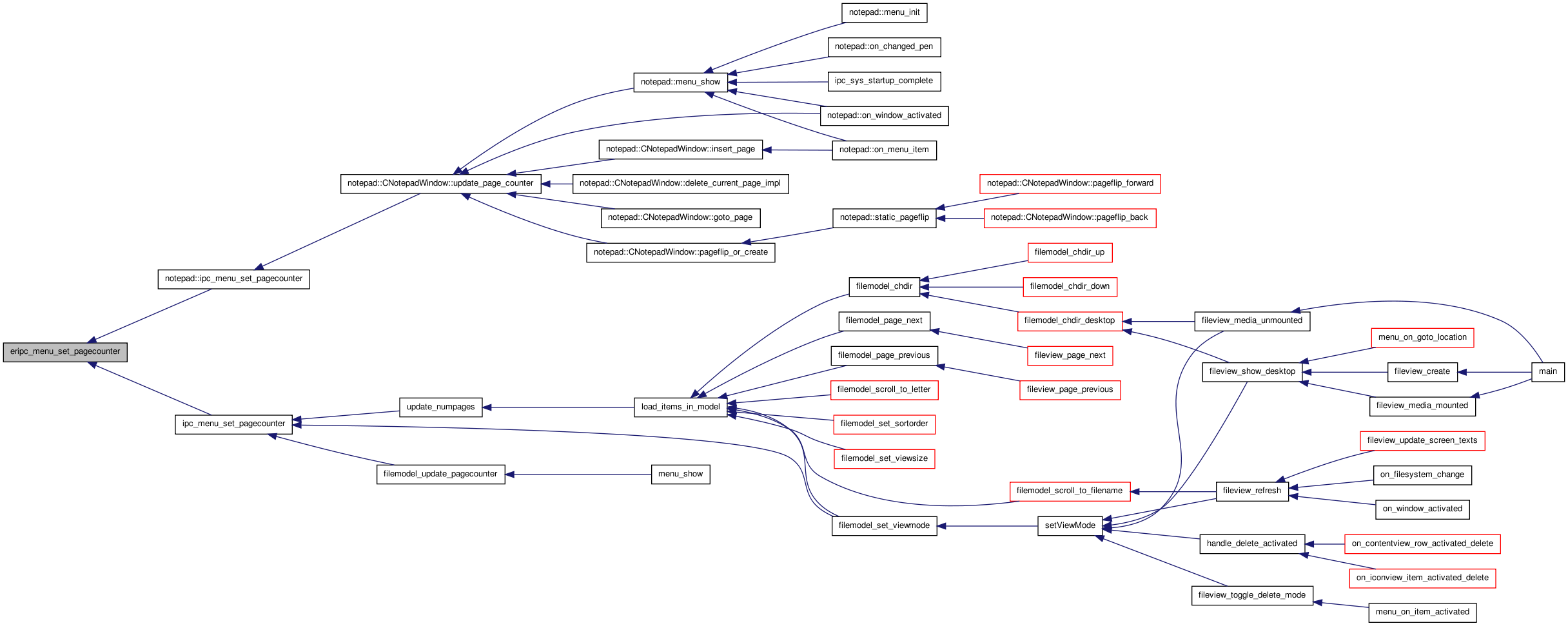
| gboolean eripc_menu_set_statusitem_state | ( | eripc_client_context_t * | ccontext, | |
| const char * | item, | |||
| const char * | state | |||
| ) |
Set a statusbar item's state
Definition at line 431 of file support.c.
References DBUS_SERVICE_POPUP_MENU, and MAKE_VARARG_CALL_2S.
Referenced by ipc_menu_set_statusitem_state(), ipc_set_stylus(), notepad::ipc_status_set_stylus(), and ipc_status_set_stylus().
00434 { 00435 MAKE_VARARG_CALL_2S(DBUS_SERVICE_POPUP_MENU, "setStatusItemState", item, state); 00436 }
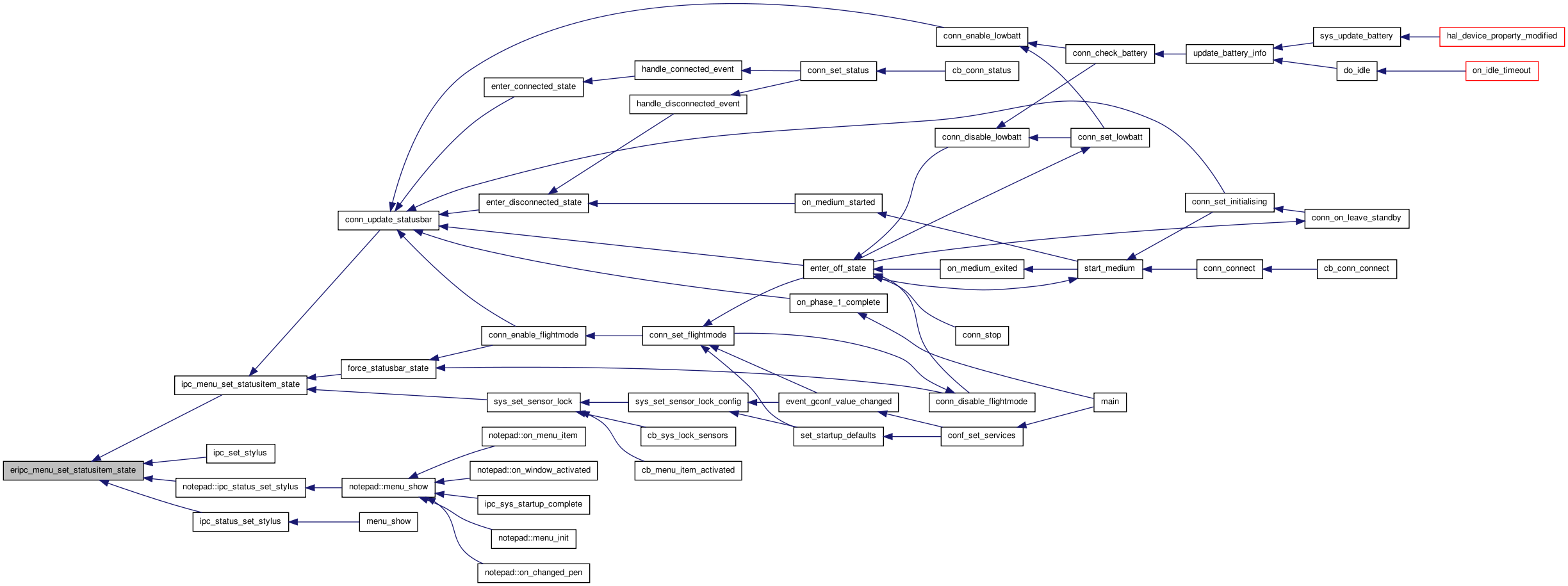
| gboolean eripc_menu_show_menu | ( | eripc_client_context_t * | ccontext, | |
| const char * | name | |||
| ) |
Show a specific popupmenu menu
Definition at line 394 of file support.c.
References DBUS_SERVICE_POPUP_MENU, and MAKE_VARARG_CALL_1S.
Referenced by ipc_menu_show(), ipc_menu_show_menu(), and notepad::menu_show().
00396 { 00397 MAKE_VARARG_CALL_1S(DBUS_SERVICE_POPUP_MENU, "showMenu", name); 00398 }
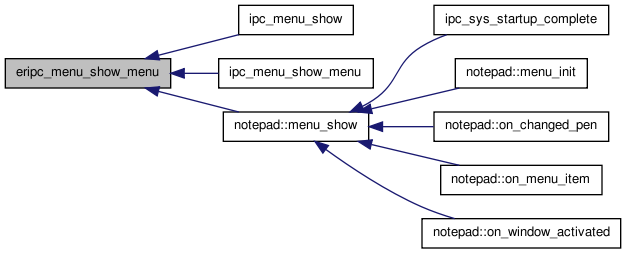
| eripc_error_t eripc_reply_bool | ( | eripc_context_t * | context, | |
| const char * | message_id, | |||
| gboolean | value | |||
| ) |
This function returns a reply to a message with a boolean argument.
Instead of the variable arguments of eripc_reply_varargs, this function has single boolean as argument.
- Parameters:
-
context IPC context returned by eripc_init. message_id ID string of the received message to reply to. value The argument value.
- Returns:
- ERIPC_ERROR_SUCCESS on success.
Definition at line 868 of file rpc.c.
References eripc_reply_varargs(), ERIPC_TYPE_BOOL, and ERIPC_TYPE_INVALID.
Referenced by ipc_send_reply(), menuActivated_rh(), on_file_close(), on_ping(), on_window_activated(), and on_window_deactivated().
00871 { 00872 eripc_error_t rc; 00873 rc = eripc_reply_varargs(context, message_id, 00874 ERIPC_TYPE_BOOL, value, 00875 ERIPC_TYPE_INVALID); 00876 return rc; 00877 }

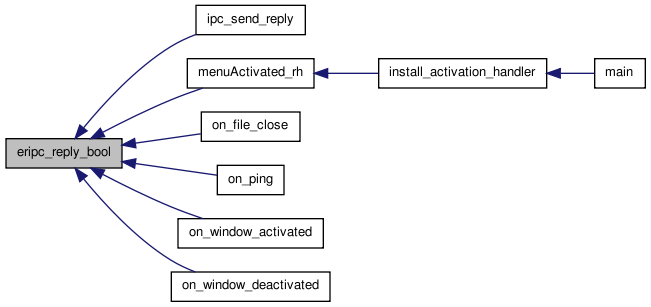
| eripc_error_t eripc_reply_error | ( | eripc_context_t * | context, | |
| const char * | message_id, | |||
| const char * | error_name, | |||
| const char * | error_message | |||
| ) |
This function return an error in reply to a message.
The error_name indicates the error which can be fully-qualitfied. When the service is omitted from the error name, the service of the given context is used.
- Parameters:
-
context IPC context returned by eripc_init. message_id ID string of the received message to reply to. error_name The name of the error to return. error_message Text string with error description.
- Returns:
- ERIPC_ERROR_SUCCESS on success.
Definition at line 879 of file rpc.c.
References _parse_id(), _eripc_context_t::conn, ERIPC_BUS_SESSION, ERIPC_BUS_SYSTEM, ERIPC_ERROR, ERIPC_ERROR_INVALID, ERIPC_ERROR_OOM, ERIPC_ERROR_SUCCESS, _eripc_context_t::error_dummy, MAX_ERROR_LEN, MAX_SVC_LEN, sender, serial, _eripc_context_t::service, _eripc_context_t::sys_conn, and ULOG_ERR_F.
00883 { 00884 DBusConnection *conn; 00885 DBusMessage *reply; 00886 dbus_bool_t ret; 00887 char sender[MAX_SVC_LEN + 1], error_name[MAX_ERROR_LEN + 1]; 00888 int serial; 00889 eripc_bus_t bus_type; 00890 00891 if (context == NULL || name == NULL || message_id == NULL) { 00892 return ERIPC_ERROR_INVALID; 00893 } 00894 if (context->error_dummy == NULL) { 00895 /* OOM has happened earlier in the handler, or 00896 * the context is invalid */ 00897 ULOG_ERR_F("error_dummy has not been created"); 00898 return ERIPC_ERROR; 00899 } 00900 00901 _parse_id(message_id, &bus_type, sender, &serial); 00902 assert(bus_type == ERIPC_BUS_SYSTEM || bus_type == ERIPC_BUS_SESSION); 00903 00904 if (bus_type == ERIPC_BUS_SYSTEM) { 00905 conn = context->sys_conn; 00906 } else { 00907 conn = context->conn; 00908 } 00909 if (!dbus_connection_get_is_connected(conn)) { 00910 ULOG_ERR_F("connection %p is not open", conn); 00911 return ERIPC_ERROR_INVALID; 00912 } 00913 00914 make_default_error_name(context->service, name, error_name); 00915 00916 /* make a copy of the error_dummy and modify the copy */ 00917 reply = dbus_message_copy(context->error_dummy); 00918 if (reply == NULL) { 00919 ULOG_ERR_F("dbus_message_copy failed"); 00920 return ERIPC_ERROR_OOM; 00921 } 00922 if (!dbus_message_set_destination(reply, sender)) { 00923 ULOG_ERR_F("dbus_message_set_destination failed"); 00924 goto unref_and_exit; 00925 } 00926 if (!dbus_message_set_reply_serial(reply, serial)) { 00927 ULOG_ERR_F("dbus_message_set_reply_serial failed"); 00928 goto unref_and_exit; 00929 } 00930 if (!dbus_message_set_error_name(reply, error_name)) { 00931 ULOG_ERR_F("dbus_message_set_error_name failed"); 00932 goto unref_and_exit; 00933 } 00934 00935 if (message != NULL) { 00936 ret = dbus_message_append_args(reply, DBUS_TYPE_STRING, 00937 &message, 00938 DBUS_TYPE_INVALID); 00939 if (!ret) { 00940 ULOG_ERR_F("dbus_message_append_args failed"); 00941 goto unref_and_exit; 00942 } 00943 } 00944 00945 if (!dbus_connection_send(conn, reply, NULL)) { 00946 ULOG_ERR_F("dbus_connection_send failed"); 00947 goto unref_and_exit; 00948 } 00949 dbus_message_unref(reply); 00950 return ERIPC_ERROR_SUCCESS; 00951 00952 unref_and_exit: 00953 dbus_message_unref(reply); 00954 return ERIPC_ERROR_OOM; 00955 }

| eripc_error_t eripc_reply_int | ( | eripc_context_t * | context, | |
| const char * | message_id, | |||
| int | value | |||
| ) |
This function returns a reply to a message with an integer argument.
Instead of the variable arguments of eripc_reply_varargs, this function has single integer as argument.
- Parameters:
-
context IPC context returned by eripc_init. message_id ID string of the received message to reply to. value The argument value.
- Returns:
- ERIPC_ERROR_SUCCESS on success.
Definition at line 857 of file rpc.c.
References eripc_reply_varargs(), ERIPC_TYPE_INT, and ERIPC_TYPE_INVALID.
00860 { 00861 eripc_error_t rc; 00862 rc = eripc_reply_varargs(context, message_id, 00863 ERIPC_TYPE_INT, value, 00864 ERIPC_TYPE_INVALID); 00865 return rc; 00866 }

| eripc_error_t eripc_reply_string | ( | eripc_context_t * | context, | |
| const char * | message_id, | |||
| const char * | string | |||
| ) |
This function returns a reply to a message with a string argument.
Instead of the variable arguments of eripc_reply_varargs, this function has single string as argument.
- Parameters:
-
context IPC context returned by eripc_init. message_id ID string of the received message to reply to. string The argument string.
- Returns:
- ERIPC_ERROR_SUCCESS on success.
Definition at line 846 of file rpc.c.
References eripc_reply_varargs(), ERIPC_TYPE_INVALID, and ERIPC_TYPE_STRING.
Referenced by cb_sys_get_card_mountpoint(), testing_list_menu_items_cb(), testing_list_tasks(), and testing_route_menu_item_cb().
00849 { 00850 eripc_error_t rc; 00851 rc = eripc_reply_varargs(context, message_id, 00852 ERIPC_TYPE_STRING, string, 00853 ERIPC_TYPE_INVALID); 00854 return rc; 00855 }

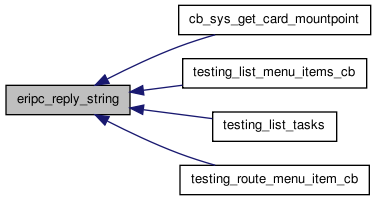
| eripc_error_t eripc_reply_varargs | ( | eripc_context_t * | context, | |
| const char * | message_id, | |||
| eripc_data_t | arg_type, | |||
| ... | ||||
| ) |
This function returns a reply to a message with variable arguments.
The variable arguments work in a type-value pairs. The type argument defines the type of the following value. If the type is G_TYPE_STRING, then the value is a pointer to a string. The list must end in a ERIPC_TYPE_INVALID. The supported types are:
- ERIPC_TYPE_BOOL
- The value is a gboolean.
- ERIPC_TYPE_BYTE, ERIPC_TYPE_INT, ERIPC_TYPE_UINT
- The value is an byte, int or an unsigned int.
- ERIPC_TYPE_DOUBLE
- The value is a float.
- ERIPC_TYPE_STRING
- The value is a pointer to a string.
- ERIPC_TYPE_DATA
- Two values are expected: first an integer indicating length of the data block (e.g. array), second a pointer to the data block.
- Parameters:
-
context IPC context returned by eripc_init. message_id ID string of the received message to reply to. arg_type The type of the first argument. ... The first argument value, and then a type-value list of other arguments. This list must end in a ERIPC_TYPE_INVALID type.
- Returns:
- ERIPC_ERROR_SUCCESS on success.
Definition at line 832 of file rpc.c.
References _reply_helper().
Referenced by cb_sys_get_battery_state(), cb_sys_get_device_capabilities(), cb_sys_get_orientation(), cb_sys_get_pageturn_inverted(), cb_sys_get_stylus(), eripc_reply_bool(), eripc_reply_int(), eripc_reply_string(), ipc_send_reply_task_start(), and on_file_open().
00835 { 00836 va_list va_args; 00837 eripc_error_t rc; 00838 00839 va_start(va_args, arg_type); 00840 rc = _reply_helper(context, message_id, 00841 arg_type, va_args); 00842 va_end(va_args); 00843 return rc; 00844 }


| eripc_error_t eripc_send_bool | ( | eripc_context_t * | context, | |
| eripc_handler_t * | reply_handler, | |||
| const void * | user_data, | |||
| eripc_bus_t | bus_type, | |||
| const char * | destination, | |||
| const char * | message_name, | |||
| gboolean | value | |||
| ) |
This function sends a boolean message and registers a reply handler.
Instead of the variable arguments of eripc_send_varargs, this function has single boolean as argument.
- Parameters:
-
context IPC context returned by eripc_init. reply_handler The handler function to call when a reply is returned. Set to NULL for no reply. user_data Optional user data to pass to the handler when it is called. bus_type The bus type (session or system bus). destination Interface name to send message to. message_name Name of the message/method to call. value The argument value.
- Returns:
- ERIPC_ERROR_SUCCESS on success.
Definition at line 727 of file rpc.c.
References eripc_send_varargs(), ERIPC_TYPE_BOOL, and ERIPC_TYPE_INVALID.
00734 { 00735 eripc_error_t rc; 00736 rc = eripc_send_varargs(context, reply_handler, user_data, 00737 bus_type, destination, message_name, 00738 ERIPC_TYPE_BOOL, value_to_send, 00739 ERIPC_TYPE_INVALID); 00740 return rc; 00741 }

| eripc_error_t eripc_send_bool_and_wait | ( | eripc_context_t * | context, | |
| eripc_event_info_t ** | reply, | |||
| eripc_bus_t | bus_type, | |||
| const char * | destination, | |||
| const char * | message_name, | |||
| gboolean | value | |||
| ) |
This function sends a boolean message and return reply immediately. This call is blocking.
Instead of the variable arguments of eripc_send_varargs_and_wait, this function has single boolean as argument.
- Parameters:
-
[in] context IPC context returned by eripc_init. [out] reply A pointer pointer to the event info structure where the return info goes. Set to NULL for no reply arguments. If the expected reply does not come within the RPC timeout value set with the eripc_set_timeout function. Caller must free the reply structure using eripc_event_info_free. [in] bus_type The bus type (session or system bus). [in] destination Interface name to send message to. [in] message_name Name of the message/method to call. [in] value The argument value.
- Returns:
- ERIPC_ERROR_SUCCESS on success.
Definition at line 678 of file rpc.c.
References eripc_send_varargs_and_wait(), ERIPC_TYPE_BOOL, and ERIPC_TYPE_INVALID.
00686 { 00687 eripc_error_t rc; 00688 rc = eripc_send_varargs_and_wait(context, reply, 00689 bus_type, destination, message_name, 00690 ERIPC_TYPE_BOOL, value_to_send, 00691 ERIPC_TYPE_INVALID); 00692 return rc; 00693 }

| eripc_error_t eripc_send_int | ( | eripc_context_t * | context, | |
| eripc_handler_t * | reply_handler, | |||
| const void * | user_data, | |||
| eripc_bus_t | bus_type, | |||
| const char * | destination, | |||
| const char * | message_name, | |||
| int | value | |||
| ) |
This function sends an integer message and registers a reply handler.
Instead of the variable arguments of eripc_send_varargs, this function has single integer as argument.
- Parameters:
-
context IPC context returned by eripc_init. reply_handler The handler function to call when a reply is returned. Set to NULL for no reply. user_data Optional user data to pass to the handler when it is called. bus_type The bus type (session or system bus). destination Interface name to send message to. message_name Name of the message/method to call. value The argument value.
- Returns:
- ERIPC_ERROR_SUCCESS on success.
Definition at line 711 of file rpc.c.
References eripc_send_varargs(), ERIPC_TYPE_INT, and ERIPC_TYPE_INVALID.
Referenced by ipc_menu_remove_task(), ipc_menu_set_first_task(), ipc_send_task_activated(), ipc_send_window_activated(), ipc_send_window_deactivated(), and ipc_send_window_show().
00718 { 00719 eripc_error_t rc; 00720 rc = eripc_send_varargs(context, reply_handler, user_data, 00721 bus_type, destination, message_name, 00722 ERIPC_TYPE_INT, value_to_send, 00723 ERIPC_TYPE_INVALID); 00724 return rc; 00725 }


| eripc_error_t eripc_send_int_and_wait | ( | eripc_context_t * | context, | |
| eripc_event_info_t ** | reply, | |||
| eripc_bus_t | bus_type, | |||
| const char * | destination, | |||
| const char * | message_name, | |||
| int | value | |||
| ) |
This function sends an integer message and return reply immediately. This call is blocking.
Instead of the variable arguments of eripc_send_varargs_and_wait, this function has single integer as argument.
- Parameters:
-
[in] context IPC context returned by eripc_init. [out] reply A pointer pointer to the event info structure where the return info goes. Set to NULL for no reply arguments. If the expected reply does not come within the RPC timeout value set with the eripc_set_timeout function. Caller must free the reply structure using eripc_event_info_free. [in] bus_type The bus type (session or system bus). [in] destination Interface name to send message to. [in] message_name Name of the message/method to call. [in] value The argument value.
- Returns:
- ERIPC_ERROR_SUCCESS on success.
Definition at line 661 of file rpc.c.
References eripc_send_varargs_and_wait(), ERIPC_TYPE_INT, and ERIPC_TYPE_INVALID.
00669 { 00670 eripc_error_t rc; 00671 rc = eripc_send_varargs_and_wait(context, reply, 00672 bus_type, destination, message_name, 00673 ERIPC_TYPE_INT, value_to_send, 00674 ERIPC_TYPE_INVALID); 00675 return rc; 00676 }

| eripc_error_t eripc_send_signal | ( | eripc_context_t * | context, | |
| eripc_bus_t | bus_type, | |||
| const char * | signal_name, | |||
| const char * | argument | |||
| ) |
This function sends a signal with optional string argument.
The signal defaults to the path and interface in the context. For more flexibility, use eripc_send_signal_varargs.
- Parameters:
-
context IPC context returned by eripc_init. bus_type The bus type (session or system bus). signal_name Name of the signal to send. argument The argument string or NULL for no argument.
- Returns:
- ERIPC_ERROR_SUCCESS on success.
Definition at line 329 of file rpc.c.
References eripc_send_signal_varargs(), ERIPC_TYPE_INVALID, ERIPC_TYPE_STRING, _eripc_context_t::interface, and _eripc_context_t::object_path.
00333 { 00334 eripc_error_t rc; 00335 00336 if (argument == NULL) 00337 { 00338 rc = eripc_send_signal_varargs(context, bus_type, 00339 context->object_path, context->interface, signal_name, 00340 ERIPC_TYPE_INVALID); 00341 } 00342 else 00343 { 00344 rc = eripc_send_signal_varargs(context, bus_type, 00345 context->object_path, context->interface, signal_name, 00346 ERIPC_TYPE_STRING, argument, 00347 ERIPC_TYPE_INVALID); 00348 } 00349 return rc; 00350 }

| eripc_error_t eripc_send_signal_varargs | ( | eripc_context_t * | context, | |
| eripc_bus_t | bus_type, | |||
| const char * | signal_path, | |||
| const char * | signal_interface, | |||
| const char * | signal_name, | |||
| eripc_data_t | arg_type, | |||
| ... | ||||
| ) |
This function sends a signal with variable arguments.
The variable arguments work in a type-value pairs. The type argument defines the type of the following value. If the type is G_TYPE_STRING, then the value is a pointer to a string. The list must end in a ERIPC_TYPE_INVALID. The supported types are:
- ERIPC_TYPE_BOOL
- The value is a gboolean.
- ERIPC_TYPE_BYTE, ERIPC_TYPE_INT, ERIPC_TYPE_UINT
- The value is an byte, int or an unsigned int.
- ERIPC_TYPE_DOUBLE
- The value is a float.
- ERIPC_TYPE_STRING
- The value is a pointer to a string.
- ERIPC_TYPE_DATA
- Two values are expected: first an integer indicating length of the data block (e.g. array), second a pointer to the data block.
- Parameters:
-
context IPC context returned by eripc_init. bus_type The bus type (session or system bus). signal_path The object path of the signal to send. signal_interface The interface name of the signal to send. signal_name Name of the signal to send. arg_type The type of the first argument. ... The first argument value, and then a type-value list of other arguments. This list must end in a ERIPC_TYPE_INVALID type.
- Returns:
- ERIPC_ERROR_SUCCESS on success.
Definition at line 310 of file rpc.c.
References _send_signal_helper().
Referenced by eripc_send_signal(), ipc_broadcast_conn_signal(), ipc_broadcast_conn_status(), ipc_send_battery_state(), ipc_send_changed_locale(), ipc_send_changed_orientation(), ipc_send_changed_pageturn_inverted(), ipc_send_demo_mode(), ipc_send_prepare_standby(), ipc_send_prepare_unmount(), ipc_send_usb_state(), ipc_send_volume_mounted(), ipc_send_volume_unmounted(), and ipc_sys_startup_complete().
00316 { 00317 va_list va_args; 00318 eripc_error_t rc; 00319 00320 va_start(va_args, arg_type); 00321 rc = _send_signal_helper(context, bus_type, 00322 signal_path, signal_interface, signal_name, 00323 arg_type, va_args); 00324 va_end(va_args); 00325 return rc; 00326 }

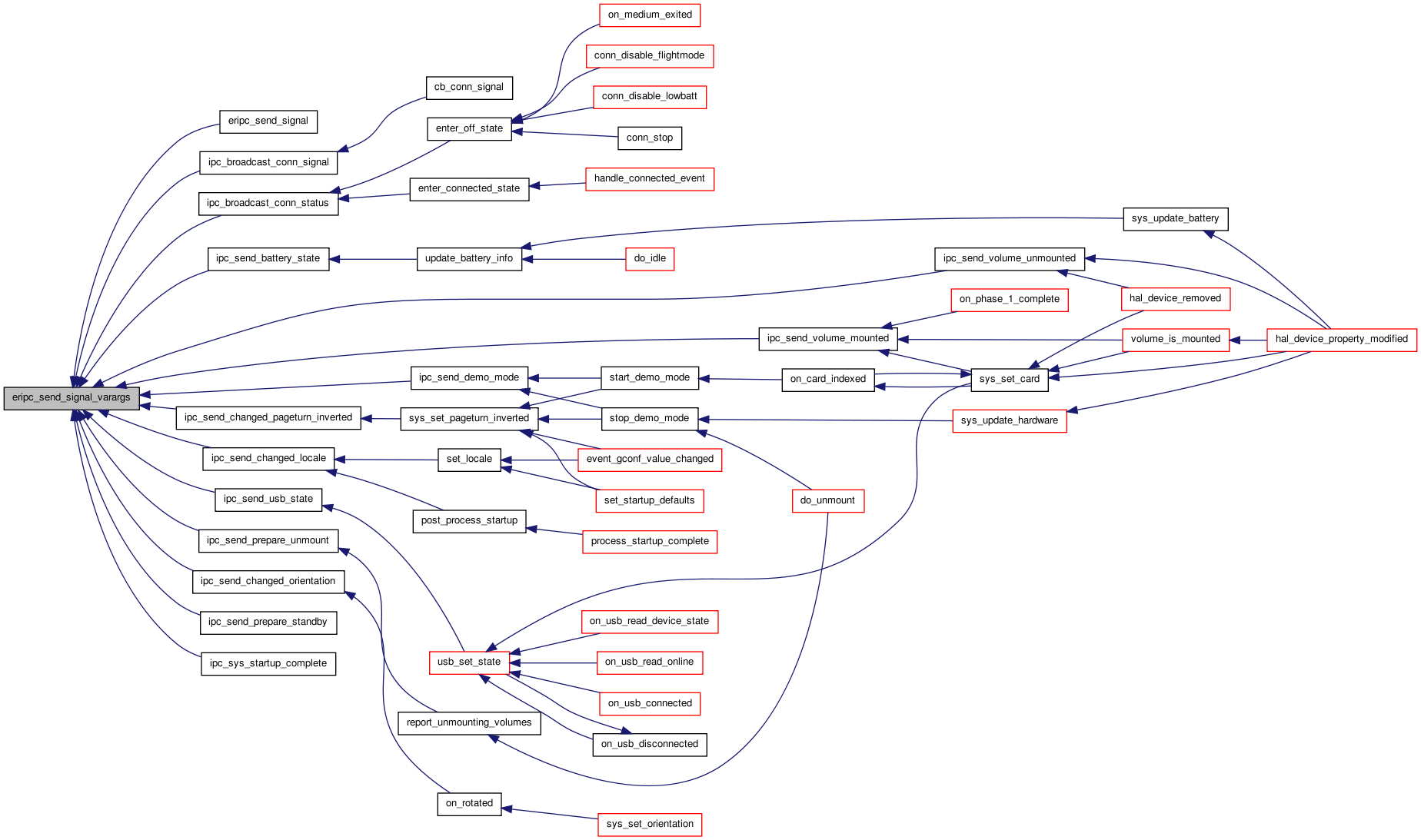
| eripc_error_t eripc_send_string | ( | eripc_context_t * | context, | |
| eripc_handler_t * | reply_handler, | |||
| const void * | user_data, | |||
| eripc_bus_t | bus_type, | |||
| const char * | destination, | |||
| const char * | message_name, | |||
| const char * | string | |||
| ) |
This function sends a string message and registers a reply handler.
Instead of the variable arguments of eripc_send_varargs, this function has single string as argument.
- Parameters:
-
context IPC context returned by eripc_init. reply_handler The handler function to call when a reply is returned. Set to NULL for no reply. user_data Optional user data to pass to the handler when it is called. bus_type The bus type (session or system bus). destination Interface name to send message to. message_name Name of the message/method to call. string The argument string.
- Returns:
- ERIPC_ERROR_SUCCESS on success.
Definition at line 695 of file rpc.c.
References eripc_send_varargs(), ERIPC_TYPE_INVALID, and ERIPC_TYPE_STRING.
Referenced by ipc_confirm_install_drz(), ipc_confirm_install_update(), ipc_confirm_usbconnect(), ipc_ctb_goto(), ipc_send_close(), ipc_send_open(), ipc_send_volume_mounted_to(), ipc_show_message(), ipc_show_popup(), and ipc_show_splash().
00702 { 00703 eripc_error_t rc; 00704 rc = eripc_send_varargs(context, reply_handler, user_data, 00705 bus_type, destination, message_name, 00706 ERIPC_TYPE_STRING, string_to_send, 00707 ERIPC_TYPE_INVALID); 00708 return rc; 00709 }

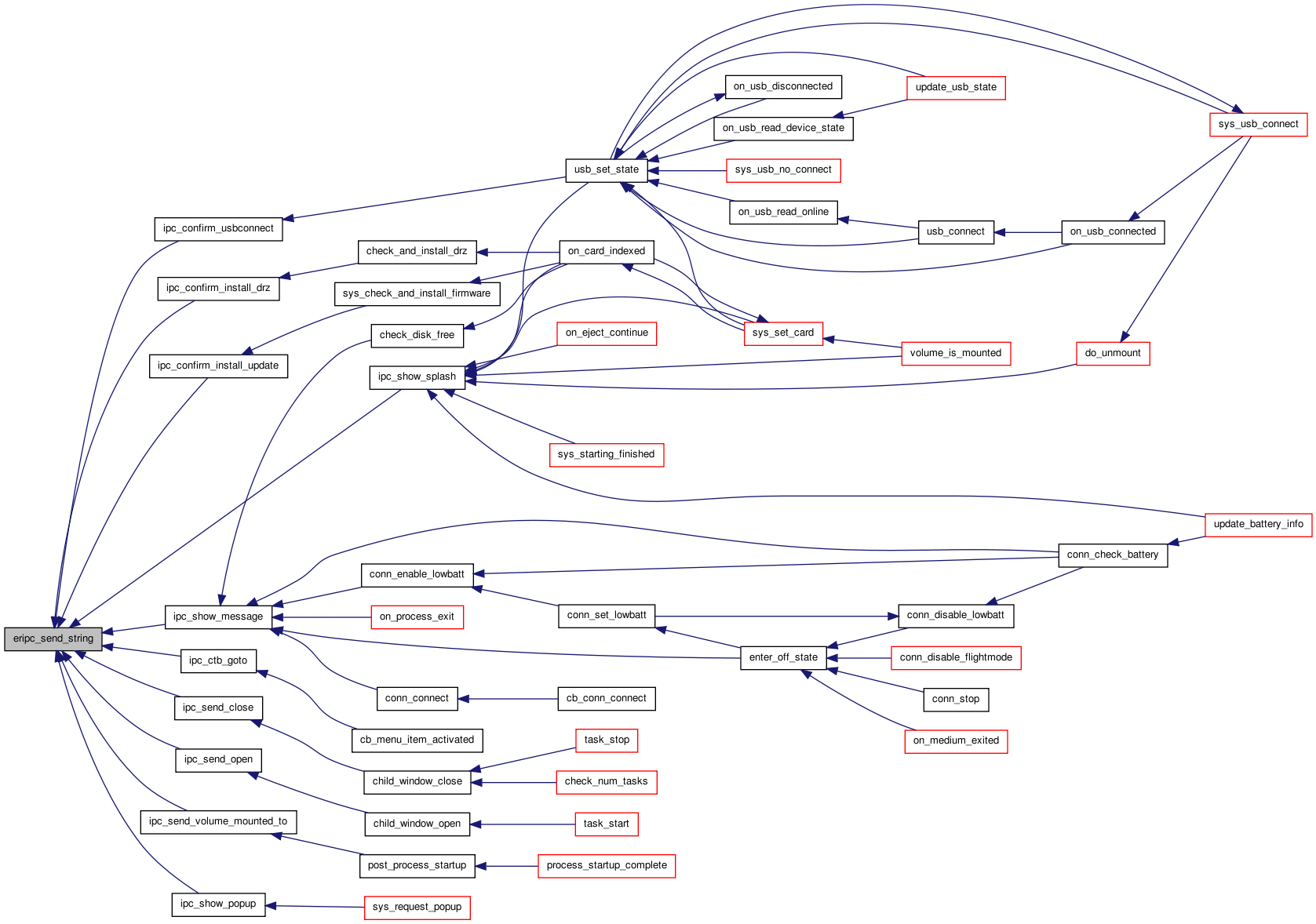
| eripc_error_t eripc_send_string_and_wait | ( | eripc_context_t * | context, | |
| eripc_event_info_t ** | reply, | |||
| eripc_bus_t | bus_type, | |||
| const char * | destination, | |||
| const char * | message_name, | |||
| const char * | string | |||
| ) |
This function sends a string message and return reply immediately. This call is blocking.
Instead of the variable arguments of eripc_send_varargs_and_wait, this function has single string as argument.
- Parameters:
-
[in] context IPC context returned by eripc_init. [out] reply A pointer pointer to the event info structure where the return info goes. Set to NULL for no reply arguments. If the expected reply does not come within the RPC timeout value set with the eripc_set_timeout function. Caller must free the reply structure using eripc_event_info_free. [in] bus_type The bus type (session or system bus). [in] destination Interface name to send message to. [in] message_name Name of the message/method to call. [in] string The argument string.
- Returns:
- ERIPC_ERROR_SUCCESS on success.
Definition at line 644 of file rpc.c.
References eripc_send_varargs_and_wait(), ERIPC_TYPE_INVALID, and ERIPC_TYPE_STRING.
Referenced by ipc_send_store_metadata().
00652 { 00653 eripc_error_t rc; 00654 rc = eripc_send_varargs_and_wait(context, reply, 00655 bus_type, destination, message_name, 00656 ERIPC_TYPE_STRING, string_to_send, 00657 ERIPC_TYPE_INVALID); 00658 return rc; 00659 }


| eripc_error_t eripc_send_varargs | ( | eripc_context_t * | context, | |
| eripc_handler_t * | reply_handler, | |||
| const void * | user_data, | |||
| eripc_bus_t | bus_type, | |||
| const char * | destination, | |||
| const char * | message_name, | |||
| eripc_data_t | arg_type, | |||
| ... | ||||
| ) |
This function sends a variable message and registers a reply handler.
The variable arguments work in a type-value pairs. The type argument defines the type of the following value. If the type is G_TYPE_STRING, then the value is a pointer to a string. The list must end in a ERIPC_TYPE_INVALID. The supported types are:
- ERIPC_TYPE_BOOL
- The value is a gboolean.
- ERIPC_TYPE_BYTE, ERIPC_TYPE_INT, ERIPC_TYPE_UINT
- The value is an byte, int or an unsigned int.
- ERIPC_TYPE_DOUBLE
- The value is a float.
- ERIPC_TYPE_STRING
- The value is a pointer to a string.
- ERIPC_TYPE_DATA
- Two values are expected: first an integer indicating length of the data block (e.g. array), second a pointer to the data block.
- Parameters:
-
context IPC context returned by eripc_init. reply_handler The handler function to call when a reply is returned. Set to NULL for no reply. user_data Optional user data to pass to the handler when it is called. bus_type The bus type (session or system bus). destination Interface name to send message to. message_name Name of the message/method to call. arg_type The type of the first argument. ... The first argument value, and then a type-value list of other arguments. This list must end in a ERIPC_TYPE_INVALID type.
- Returns:
- ERIPC_ERROR_SUCCESS on success.
Definition at line 607 of file rpc.c.
References _send_helper().
Referenced by add_group(), add_item(), add_menu(), eripc_send_bool(), eripc_send_int(), eripc_send_string(), ipc_add_profile(), notepad::ipc_change_filename(), ipc_connect(), ipc_disconnect(), ipc_edit_profile(), ipc_menu_add_group(), ipc_menu_add_item(), ipc_menu_add_menu(), ipc_menu_add_task(), ipc_menu_rename_task(), ipc_menu_set_group_label(), ipc_menu_set_group_state(), ipc_menu_set_item_label(), ipc_menu_set_item_state(), ipc_menu_set_menu_label(), ipc_menu_show_menu(), notepad::ipc_menu_update_toolbar(), ipc_menu_updates_finished(), ipc_refresh_ctb(), ipc_remove_menu(), ipc_send_conn_status(), ipc_send_item_activated(), ipc_send_page_change(), ipc_send_ping(), ipc_send_status_item_activated(), ipc_set_orientation(), ipc_show_busy(), ipc_sys_standby(), main(), notepad::menu_show(), remove_group(), and remove_menu().
00614 { 00615 va_list va_args; 00616 eripc_error_t rc; 00617 00618 va_start(va_args, arg_type); 00619 rc = _send_helper(context, reply_handler, user_data, 00620 bus_type, destination, message_name, 00621 arg_type, va_args); 00622 va_end(va_args); 00623 return rc; 00624 }


| eripc_error_t eripc_send_varargs_and_wait | ( | eripc_context_t * | context, | |
| eripc_event_info_t ** | reply, | |||
| eripc_bus_t | bus_type, | |||
| const char * | destination, | |||
| const char * | message_name, | |||
| eripc_data_t | arg_type, | |||
| ... | ||||
| ) |
This function sends a variable message and return reply immediately. This call is blocking.
The variable arguments work in a type-value pairs. The type argument defines the type of the following value. If the type is G_TYPE_STRING, then the value is a pointer to a string. The list must end in a ERIPC_TYPE_INVALID. The supported types are:
- ERIPC_TYPE_BOOL
- The value is a gboolean.
- ERIPC_TYPE_BYTE, ERIPC_TYPE_INT, ERIPC_TYPE_UINT
- The value is an byte, int or an unsigned int.
- ERIPC_TYPE_DOUBLE
- The value is a float.
- ERIPC_TYPE_STRING
- The value is a pointer to a string.
- ERIPC_TYPE_DATA
- Two values are expected: first an integer indicating length of the data block (e.g. array), second a pointer to the data block.
- Parameters:
-
[in] context IPC context returned by eripc_init. [out] reply A pointer pointer to the event info structure where the return info goes. Set to NULL for no reply arguments. If the expected reply does not come within the RPC timeout value set with the eripc_set_timeout function. Caller must free the reply structure using eripc_event_info_free. [in] bus_type The bus type (session or system bus). [in] destination Interface name to send message to. [in] message_name Name of the message/method to call. [in] arg_type The type of the first argument. [in] ... The first argument value, and then a type-value list of other arguments. This list must end in a ERIPC_TYPE_INVALID type.
- Returns:
- ERIPC_ERROR_SUCCESS on success.
Definition at line 627 of file rpc.c.
References _send_sync_helper().
Referenced by eripc_send_bool_and_wait(), eripc_send_int_and_wait(), eripc_send_string_and_wait(), hide_statusitem(), ipc_get_battery_state(), notepad::ipc_get_mountpoint(), ipc_get_orientation(), notepad::ipc_get_rotation(), notepad::ipc_sys_is_in_portrait_mode(), ipc_sys_is_in_portrait_mode(), notepad::ipc_sys_is_pageturn_inverted(), ipc_sys_is_pageturn_inverted(), ipc_sys_start_task(), is_in_portrait_orientation(), remove_group(), remove_item(), remove_menu(), set_group_state(), set_item_state(), set_popup_state(), set_statusitem_state(), show_menu(), and show_statusitem().
00633 { 00634 va_list va_args; 00635 eripc_error_t rc; 00636 00637 va_start(va_args, arg_type); 00638 rc = _send_sync_helper(context, reply, bus_type, destination, 00639 message_name, arg_type, va_args); 00640 va_end(va_args); 00641 return rc; 00642 }

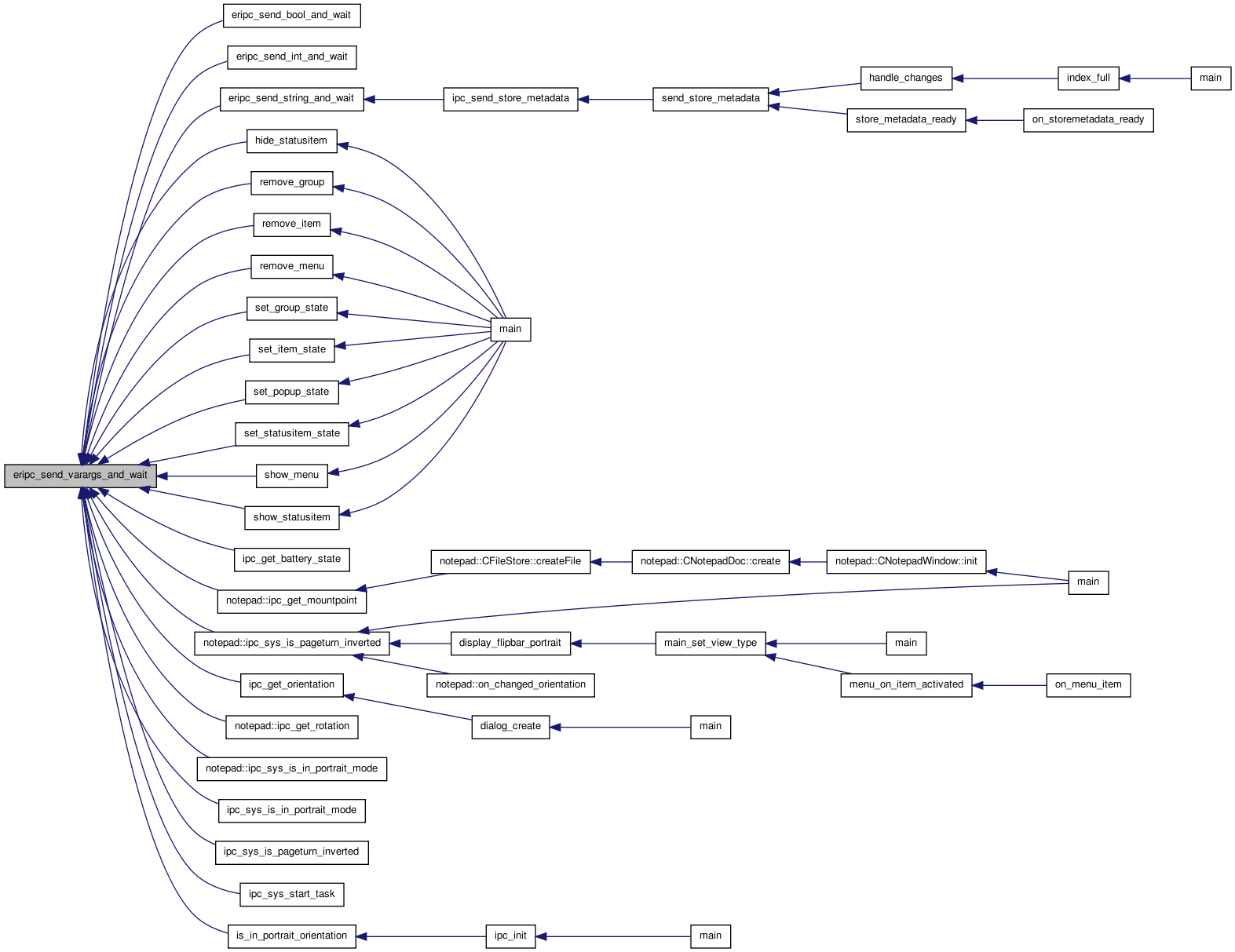
| eripc_error_t eripc_set_event_handler | ( | eripc_context_t * | context, | |
| const eripc_event_info_t * | info, | |||
| eripc_handler_t * | handler, | |||
| void * | user_data, | |||
| int * | handler_id | |||
| ) |
This function registers a custom handler for event, message, or signal.
- Parameters:
-
context IPC context returned by eripc_init. info Structure specifying the type of events to handle. handler The handler function to call when the event happens. user_data Optional user data to pass to the handler when it is called. handler_id Return location for the handler ID, which is used to unregister the handler.
- Returns:
- ERIPC_ERROR_SUCCESS on success.
Definition at line 463 of file hw.c.
References _set_handler(), eripc_event_info_t::bus_type, compose_match(), ERIPC_BUS_BOTH, ERIPC_BUS_IRRELEVANT, ERIPC_BUS_SESSION, ERIPC_BUS_SYSTEM, ERIPC_ERROR_INVALID, ERIPC_ERROR_OOM, ERIPC_ERROR_SUCCESS, eripc_event_info_t::event_type, generic_signal_handler(), eripc_event_info_t::interface, eripc_event_info_t::name, _eripc_context_t::next_handler_id, eripc_event_info_t::path, eripc_event_info_t::service, ULOG_DEBUG_F, and ULOG_ERR_F.
Referenced by eripc_set_message_handler(), and eripc_set_signal_handler().
00468 { 00469 eripc_error_t error = ERIPC_ERROR_SUCCESS; 00470 _osso_handler_f *event_cb = NULL; 00471 char *tmp_match = NULL, *match = NULL, *sys_match = NULL; 00472 int new_handler_id; 00473 eripc_error_t ret; 00474 eripc_bus_t bus_type; 00475 00476 ULOG_DEBUG_F("entered"); 00477 00478 if (context == NULL || handler == NULL) { 00479 ULOG_ERR_F("invalid arguments"); 00480 return ERIPC_ERROR_INVALID; 00481 } 00482 00483 if (info == NULL) { 00484 ULOG_ERR_F("info structure must be provided"); 00485 return ERIPC_ERROR_INVALID; 00486 } 00487 00488 if (info->bus_type == ERIPC_BUS_IRRELEVANT) { 00489 bus_type = ERIPC_BUS_BOTH; 00490 } else { 00491 bus_type = info->bus_type; 00492 } 00493 00494 new_handler_id = context->next_handler_id++; 00495 00496 event_cb = generic_signal_handler; 00497 00498 ret = compose_match(info, &tmp_match); 00499 ULOG_DEBUG_F("match='%s'", tmp_match); 00500 00501 if (ret == ERIPC_ERROR_SUCCESS) { 00502 if (bus_type == ERIPC_BUS_BOTH 00503 || bus_type == ERIPC_BUS_SESSION) { 00504 match = tmp_match; 00505 } 00506 if (bus_type == ERIPC_BUS_BOTH 00507 || bus_type == ERIPC_BUS_SYSTEM) { 00508 if (match == NULL) { 00509 sys_match = tmp_match; 00510 } else { 00511 sys_match = strdup(tmp_match); 00512 if (sys_match == NULL) { 00513 ULOG_ERR_F("strdup failed"); 00514 free(tmp_match); 00515 error = ERIPC_ERROR_OOM; 00516 goto _oom_exit; 00517 } 00518 } 00519 } 00520 error = _set_handler(context, 00521 info->service, 00522 info->path, 00523 info->interface, 00524 info->name, 00525 match, 00526 sys_match, 00527 event_cb, 00528 info->event_type, // FIXME was 0, event_type ignored 00529 handler, 00530 user_data, 00531 new_handler_id, 00532 FALSE, bus_type); 00533 } else { 00534 error = ret; 00535 } 00536 00537 _oom_exit: 00538 if (handler_id != NULL) { 00539 if (error == ERIPC_ERROR_SUCCESS) { 00540 *handler_id = new_handler_id; 00541 } else { 00542 *handler_id = 0; 00543 } 00544 } 00545 return error; 00546 }


| eripc_error_t eripc_set_message_handler | ( | eripc_context_t * | context, | |
| eripc_handler_t * | handler, | |||
| void * | user_data, | |||
| eripc_bus_t | bus_type, | |||
| const char * | source, | |||
| const char * | message_name, | |||
| int * | handler_id | |||
| ) |
This function registers a handler for a message.
- Parameters:
-
context IPC context returned by eripc_init. handler The handler function to call when the event happens. user_data Optional user data to pass to the handler when it is called. bus_type The bus type (session or system bus). source Interface name of message to receive. message_name Name of the message/method. handler_id Return location for the handler ID, which is used to unregister the handler.
- Returns:
- ERIPC_ERROR_SUCCESS on success.
Definition at line 436 of file hw.c.
References eripc_event_info_t::bus_type, ERIPC_ERROR_SUCCESS, ERIPC_EVENT_MESSAGE, eripc_set_event_handler(), eripc_event_info_t::event_type, fix_name(), eripc_event_info_t::interface, interface, and eripc_event_info_t::name.
Referenced by eripc_client_context_new(), install_activation_handler(), and ipc_set_services().
00443 { 00444 eripc_error_t error = ERIPC_ERROR_SUCCESS; 00445 eripc_event_info_t info; 00446 00447 char *interface = fix_name(source); 00448 memset(&info, 0, sizeof(info)); 00449 info.event_type = ERIPC_EVENT_MESSAGE; 00450 info.bus_type = bus_type; 00451 info.interface = interface; 00452 info.name = name; 00453 00454 error = eripc_set_event_handler(context, &info, 00455 handler, user_data, handler_id); 00456 00457 free(interface); 00458 00459 return error; 00460 }

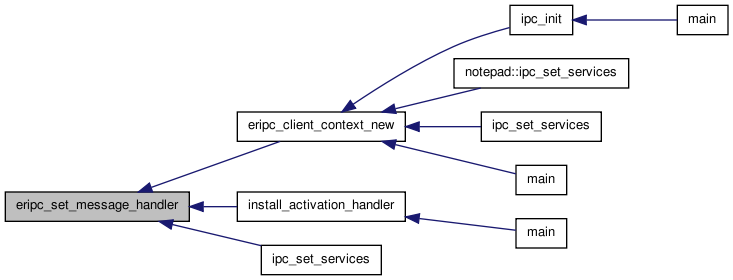
| eripc_error_t eripc_set_signal_handler | ( | eripc_context_t * | context, | |
| eripc_handler_t * | handler, | |||
| void * | user_data, | |||
| eripc_bus_t | bus_type, | |||
| const char * | source, | |||
| const char * | signal_name, | |||
| int * | handler_id | |||
| ) |
This function registers a handler for a signal.
- Parameters:
-
context IPC context returned by eripc_init. handler The handler function to call when the event happens. user_data Optional user data to pass to the handler when it is called. bus_type The bus type (session or system bus). source Interface name to receive signal/message from. signal_name Name of the signal. handler_id Return location for the handler ID, which is used to unregister the handler.
- Returns:
- ERIPC_ERROR_SUCCESS on success.
Definition at line 409 of file hw.c.
References eripc_event_info_t::bus_type, ERIPC_ERROR_SUCCESS, ERIPC_EVENT_SIGNAL, eripc_set_event_handler(), eripc_event_info_t::event_type, fix_name(), eripc_event_info_t::interface, interface, and eripc_event_info_t::name.
Referenced by eripc_client_context_new(), and ipc_set_services().
00416 { 00417 eripc_error_t error = ERIPC_ERROR_SUCCESS; 00418 eripc_event_info_t info; 00419 00420 char *interface = fix_name(source); 00421 memset(&info, 0, sizeof(info)); 00422 info.event_type = ERIPC_EVENT_SIGNAL; 00423 info.bus_type = bus_type; 00424 info.interface = interface; 00425 info.name = name; 00426 00427 error = eripc_set_event_handler(context, &info, 00428 handler, user_data, handler_id); 00429 00430 free(interface); 00431 00432 return error; 00433 }


| eripc_error_t eripc_set_timeout | ( | eripc_context_t * | context, | |
| int | timeout | |||
| ) |
Sets the timeout value used by the RPC functions.
- Parameters:
-
context IPC context returned by eripc_init. timeout The new timeout value in milliseconds.
- Returns:
- ERIPC_ERROR_SUCCESS on success.
Definition at line 169 of file rpc.c.
References ERIPC_ERROR_INVALID, ERIPC_ERROR_SUCCESS, and _eripc_context_t::timeout_ms.
Referenced by eripc_sysd_get_device_capabilities(), ipc_send_store_metadata(), ipc_set_services(), ipc_sys_start_task(), and main().
00170 { 00171 if(context == NULL) return ERIPC_ERROR_INVALID; 00172 context->timeout_ms = timeout; 00173 return ERIPC_ERROR_SUCCESS; 00174 }

| gboolean eripc_sysd_conn_connect | ( | eripc_client_context_t * | ccontext, | |
| const char * | medium, | |||
| const char * | profile | |||
| ) |
Request a network connection
Definition at line 669 of file support.c.
References DBUS_SERVICE_SYSTEM_CONTROL, MAKE_VARARG_CALL_3S, and eripc_client_context_t::service.
Referenced by ipc_sys_connect().
00672 { 00673 MAKE_VARARG_CALL_3S(DBUS_SERVICE_SYSTEM_CONTROL, "connConnect", 00674 ccontext->service, medium, profile); 00675 }

| gboolean eripc_sysd_conn_disconnect | ( | eripc_client_context_t * | ccontext | ) |
Release the network connection
Definition at line 677 of file support.c.
References DBUS_SERVICE_SYSTEM_CONTROL, MAKE_VARARG_CALL_1S, and eripc_client_context_t::service.
Referenced by ipc_sys_disconnect().
00678 { 00679 MAKE_VARARG_CALL_1S(DBUS_SERVICE_SYSTEM_CONTROL, "connDisconnect", ccontext->service); 00680 }

| gboolean eripc_sysd_conn_status_request | ( | eripc_client_context_t * | ccontext | ) |
Request the current network network status
Definition at line 682 of file support.c.
References DBUS_SERVICE_SYSTEM_CONTROL, MAKE_VARARG_CALL_1S, and eripc_client_context_t::name.
00683 { 00684 MAKE_VARARG_CALL_1S(DBUS_SERVICE_SYSTEM_CONTROL, "connConnectionStatusRequest", ccontext->name); 00685 }
| gboolean eripc_sysd_get_device_capabilities | ( | eripc_client_context_t * | ccontext, | |
| eripc_device_caps_t * | caps | |||
| ) |
Return the device's capabilities
Definition at line 638 of file support.c.
References eripc_client_context_t::context, DBUS_SERVICE_SYSTEM_CONTROL, ERIPC_ERROR_SUCCESS, eripc_get_timeout(), eripc_set_timeout(), ERIPC_TYPE_INVALID, eripc_device_caps_t::has_3g, eripc_device_caps_t::has_bluetooth, eripc_device_caps_t::has_stylus, eripc_device_caps_t::has_wifi, MAKE_VARARG_WAIT_CALL, and parse_reply_capabilities().
Referenced by get_device_capabilities(), ipc_get_device_capabilities(), and ipc_sys_get_device_capabilities().
00640 { 00641 int old_timeout; 00642 int timeout_set = 0; 00643 int retval = 0; 00644 eripc_error_t result; 00645 00646 // set default reply 00647 caps->has_stylus = FALSE; 00648 caps->has_wifi = FALSE; 00649 caps->has_bluetooth = FALSE; 00650 caps->has_3g = FALSE; 00651 00652 result = eripc_get_timeout(ccontext->context, &old_timeout); 00653 if (result == ERIPC_ERROR_SUCCESS) 00654 { 00655 result = eripc_set_timeout(ccontext->context, 5*1000); 00656 timeout_set = (result == ERIPC_ERROR_SUCCESS); 00657 } 00658 00659 MAKE_VARARG_WAIT_CALL(DBUS_SERVICE_SYSTEM_CONTROL, "sysGetDeviceCapabilities", 00660 parse_reply_capabilities(reply, caps), 00661 ERIPC_TYPE_INVALID ); 00662 00663 if (timeout_set) 00664 eripc_set_timeout(ccontext->context, old_timeout); 00665 00666 return retval; 00667 }


| gboolean eripc_sysd_mount_sd_card | ( | eripc_client_context_t * | ccontext, | |
| gboolean | show_index_splash | |||
| ) |
Request an SD card mount
Definition at line 449 of file support.c.
References DBUS_SERVICE_SYSTEM_CONTROL, ERIPC_TYPE_BOOL, ERIPC_TYPE_INVALID, and MAKE_VARARG_CALL.
Referenced by mount_sd_card().
00450 { 00451 MAKE_VARARG_CALL(DBUS_SERVICE_SYSTEM_CONTROL, "sysCardMount", 00452 ERIPC_TYPE_BOOL, show_index_splash, ERIPC_TYPE_INVALID ); 00453 }

| gint eripc_sysd_open_url | ( | eripc_client_context_t * | ccontext, | |
| const gchar * | url, | |||
| const gchar * | label, | |||
| const gchar * | back_text, | |||
| gchar ** | err_message | |||
| ) |
Request an url be opened
Definition at line 563 of file support.c.
References DBUS_SERVICE_SYSTEM_CONTROL, ERIPC_TYPE_INVALID, ERIPC_TYPE_STRING, MAKE_BUSY_TIMEOUT_END, MAKE_BUSY_TIMEOUT_START, MAKE_VARARG_WAIT_CALL, and parse_reply_start().
Referenced by ipc_sys_open_url().
00568 { 00569 int old_timeout; 00570 int timeout_set = 0; 00571 int retval = 0; 00572 eripc_error_t result; 00573 00574 MAKE_BUSY_TIMEOUT_START(60); 00575 MAKE_VARARG_WAIT_CALL(DBUS_SERVICE_SYSTEM_CONTROL, "openUrl", 00576 parse_reply_start(reply, err_message), 00577 ERIPC_TYPE_STRING, url, 00578 ERIPC_TYPE_STRING, label, 00579 ERIPC_TYPE_STRING, back_text, 00580 ERIPC_TYPE_INVALID ); 00581 MAKE_BUSY_TIMEOUT_END(); 00582 return retval; 00583 }


| gboolean eripc_sysd_reset_bg_busy | ( | eripc_client_context_t * | ccontext | ) |
Reset background busy state
Definition at line 482 of file support.c.
References DBUS_SERVICE_SYSTEM_CONTROL, ERIPC_TYPE_INVALID, and MAKE_VARARG_CALL.
Referenced by notepad::ipc_sys_bg_busy(), and ipc_sys_bg_busy().
00483 { 00484 MAKE_VARARG_CALL(DBUS_SERVICE_SYSTEM_CONTROL, "sysResetBgBusy", 00485 ERIPC_TYPE_INVALID ); 00486 }

| gboolean eripc_sysd_reset_busy | ( | eripc_client_context_t * | ccontext | ) |
Reset busy state
Definition at line 470 of file support.c.
References DBUS_SERVICE_SYSTEM_CONTROL, ERIPC_TYPE_INVALID, and MAKE_VARARG_CALL.
Referenced by notepad::ipc_sys_busy(), ipc_sys_busy(), ipc_sys_set_busy(), and ipc_sys_set_busy_nodialog().
00471 { 00472 MAKE_VARARG_CALL(DBUS_SERVICE_SYSTEM_CONTROL, "sysResetBusy", 00473 ERIPC_TYPE_INVALID ); 00474 }

| gboolean eripc_sysd_set_bg_busy | ( | eripc_client_context_t * | ccontext | ) |
Set background busy state
Definition at line 476 of file support.c.
References DBUS_SERVICE_SYSTEM_CONTROL, ERIPC_TYPE_INVALID, and MAKE_VARARG_CALL.
Referenced by notepad::ipc_sys_bg_busy(), and ipc_sys_bg_busy().
00477 { 00478 MAKE_VARARG_CALL(DBUS_SERVICE_SYSTEM_CONTROL, "sysSetBgBusy", 00479 ERIPC_TYPE_INVALID ); 00480 }

| gboolean eripc_sysd_set_busy | ( | eripc_client_context_t * | ccontext, | |
| const char * | state, | |||
| const char * | message | |||
| ) |
Set busy state
Definition at line 463 of file support.c.
References DBUS_SERVICE_SYSTEM_CONTROL, and MAKE_VARARG_CALL_2S.
Referenced by notepad::ipc_sys_busy(), ipc_sys_busy(), ipc_sys_set_busy(), and ipc_sys_set_busy_nodialog().
00466 { 00467 MAKE_VARARG_CALL_2S(DBUS_SERVICE_SYSTEM_CONTROL, "sysSetBusy", state, message); 00468 }

| gboolean eripc_sysd_set_keyboard | ( | eripc_client_context_t * | ccontext, | |
| const char * | state | |||
| ) |
Set keyboard state
Definition at line 488 of file support.c.
References DBUS_SERVICE_SYSTEM_CONTROL, and MAKE_VARARG_CALL_1S.
00490 { 00491 MAKE_VARARG_CALL_1S(DBUS_SERVICE_SYSTEM_CONTROL, "sysSetKeyboard", state); 00492 }
| gboolean eripc_sysd_set_menu_state | ( | eripc_client_context_t * | ccontext, | |
| const char * | state | |||
| ) |
Set the popupmenu's state
Definition at line 442 of file support.c.
References DBUS_SERVICE_SYSTEM_CONTROL, and MAKE_VARARG_CALL_1S.
Referenced by ipc_menu_block(), ipc_menu_popup(), ipc_menu_unblock(), ipc_send_request_popup(), and notepad::menu_block().
00444 { 00445 MAKE_VARARG_CALL_1S(DBUS_SERVICE_SYSTEM_CONTROL, "menuRequestPopup", state); 00446 }
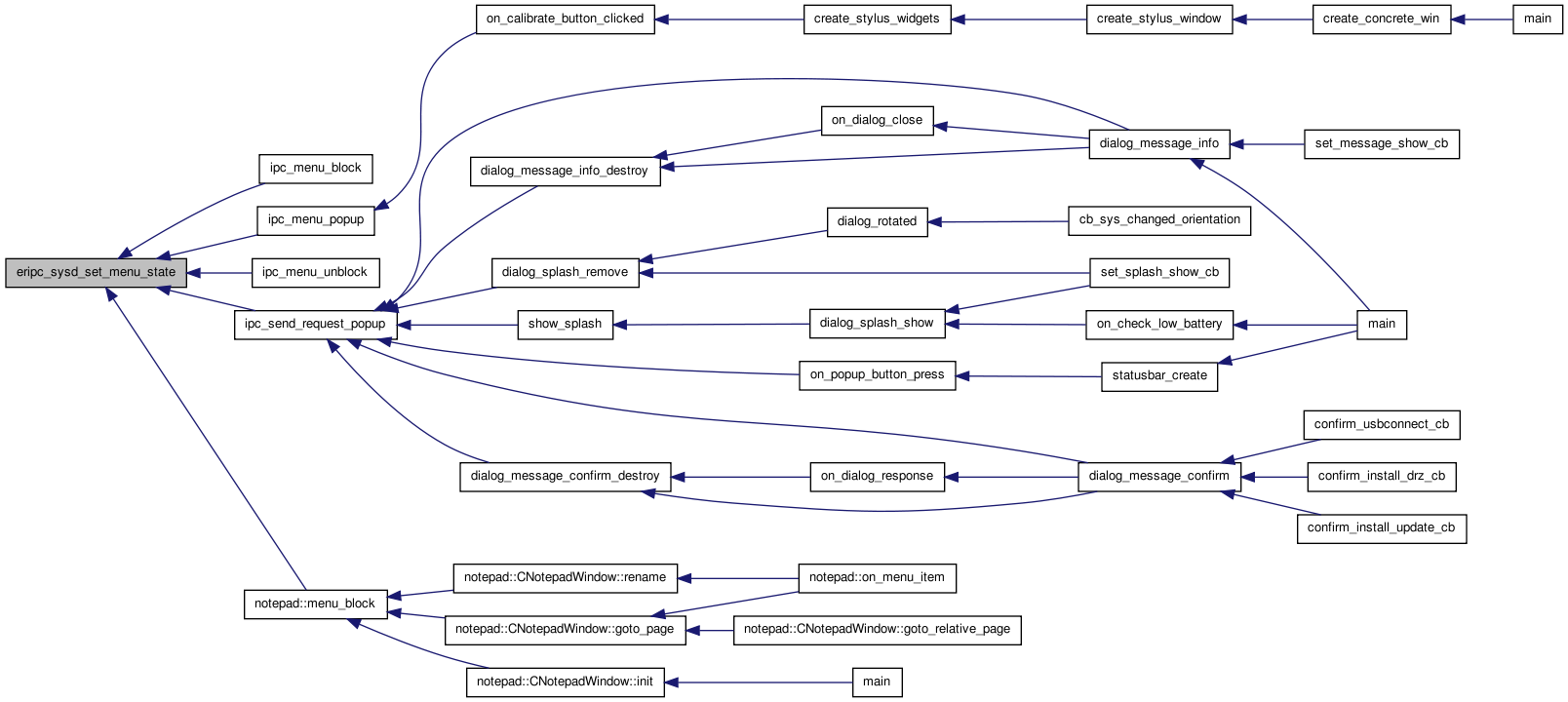
| gint eripc_sysd_start_task | ( | eripc_client_context_t * | ccontext, | |
| const gchar * | cmd_line, | |||
| const gchar * | work_dir, | |||
| const gchar * | label, | |||
| const gchar * | thumbnail_path, | |||
| gchar ** | err_message | |||
| ) |
Request a task be started
Definition at line 533 of file support.c.
References DBUS_SERVICE_SYSTEM_CONTROL, ERIPC_TYPE_INVALID, ERIPC_TYPE_STRING, MAKE_BUSY_TIMEOUT_END, MAKE_BUSY_TIMEOUT_START, MAKE_VARARG_WAIT_CALL, and parse_reply_start().
Referenced by ipc_sys_start_task().
00539 { 00540 int old_timeout; 00541 int timeout_set = 0; 00542 int retval = 0; 00543 eripc_error_t result; 00544 00545 MAKE_BUSY_TIMEOUT_START(60); 00546 MAKE_VARARG_WAIT_CALL(DBUS_SERVICE_SYSTEM_CONTROL, "startTask", 00547 parse_reply_start(reply, err_message), 00548 ERIPC_TYPE_STRING, cmd_line, 00549 ERIPC_TYPE_STRING, work_dir, 00550 ERIPC_TYPE_STRING, label, 00551 ERIPC_TYPE_STRING, thumbnail_path, 00552 ERIPC_TYPE_INVALID ); 00553 MAKE_BUSY_TIMEOUT_END(); 00554 return retval; 00555 }


| gboolean eripc_sysd_startup_complete | ( | eripc_client_context_t * | ccontext, | |
| const int | pid, | |||
| const gboolean | is_multidoc, | |||
| const int | xid | |||
| ) |
Signal the application has completed startup
Definition at line 494 of file support.c.
References DBUS_SERVICE_SYSTEM_CONTROL, ERIPC_TYPE_BOOL, ERIPC_TYPE_INT, ERIPC_TYPE_INVALID, ERIPC_TYPE_STRING, MAKE_SIGNAL_VARARG_CALL, eripc_client_context_t::name, and eripc_client_context_t::service.
Referenced by ipc_send_startup_complete(), and ipc_sys_startup_complete().
00498 { 00499 MAKE_SIGNAL_VARARG_CALL(DBUS_SERVICE_SYSTEM_CONTROL, "startupComplete", 00500 ERIPC_TYPE_STRING, ccontext->name, 00501 ERIPC_TYPE_INT, pid, 00502 ERIPC_TYPE_BOOL, is_multidoc, 00503 ERIPC_TYPE_STRING, ccontext->service, 00504 ERIPC_TYPE_INT, xid, 00505 ERIPC_TYPE_INVALID ); 00506 }

| gboolean eripc_sysd_stop_task | ( | eripc_client_context_t * | ccontext, | |
| const char * | cmd_line | |||
| ) |
Request a task be stopped
Definition at line 557 of file support.c.
References DBUS_SERVICE_SYSTEM_CONTROL, and MAKE_VARARG_CALL_1S.
Referenced by ipc_sys_stop_task().
00559 { 00560 MAKE_VARARG_CALL_1S(DBUS_SERVICE_SYSTEM_CONTROL, "stopTask", cmd_line); 00561 }

| gboolean eripc_sysd_unmount_sd_card | ( | eripc_client_context_t * | ccontext | ) |
Request an SD card unmount
Definition at line 456 of file support.c.
References DBUS_SERVICE_SYSTEM_CONTROL, ERIPC_TYPE_INVALID, and MAKE_VARARG_CALL.
Referenced by unmount_sd_card().
00457 { 00458 MAKE_VARARG_CALL(DBUS_SERVICE_SYSTEM_CONTROL, "sysCardUnmount", 00459 ERIPC_TYPE_INVALID ); 00460 }

| eripc_error_t eripc_unset_handler | ( | eripc_context_t * | context, | |
| int | handler_id | |||
| ) |
This function unregisters a handler for event, message, or signal.
- Parameters:
-
context IPC context returned by eripc_init. handler_id Handler to unregister. The handler will not be called after it has been successfully unregistered.
- Returns:
- ERIPC_ERROR_SUCCESS on success.
Definition at line 548 of file hw.c.
References ERIPC_ERROR_INVALID, ERIPC_ERROR_SUCCESS, ULOG_DEBUG_F, and ULOG_ERR_F.
Referenced by eripc_client_context_free(), ipc_unset_services(), and term_handler().
00550 { 00551 ULOG_DEBUG_F("entered"); 00552 00553 if (context == NULL || handler_id == 0) { 00554 ULOG_ERR_F("invalid arguments"); 00555 return ERIPC_ERROR_INVALID; 00556 } 00557 00558 if (_unset_handler((_eripc_context_t*)context, handler_id)) { 00559 return ERIPC_ERROR_SUCCESS; 00560 } else { 00561 /* id was not found */ 00562 return ERIPC_ERROR_INVALID; 00563 } 00564 }

| gboolean validate_appname | ( | const gchar * | application | ) |
Variable Documentation
| void eripc_bus_t* bus |
Definition at line 213 of file internal.h.
| gboolean _osso_handler_f _osso_callback_data_t int gboolean call_once_per_handler_id |
Definition at line 202 of file internal.h.
| gboolean _osso_handler_f _osso_callback_data_t * data |
Definition at line 185 of file internal.h.
Referenced by utils::Listeners::add_listener(), chunk_program(), export_device_info(), get_application_window(), images::DataContainer< MarkerEntry * >::get_count(), text::DataContainer< T * >::get_count(), images::DataContainer< T * >::get_count(), images::DataContainer< MarkerEntry * >::get_first_element(), text::DataContainer< T * >::get_first_element(), images::DataContainer< T * >::get_first_element(), get_window_list(), link_html(), main(), micro_enter_mode(), micro_read_devicetype(), micro_write_devicetype(), page_html(), pagebar_load_bitmaps(), print_window_list(), images::DataContainer< MarkerEntry * >::ref(), text::DataContainer< T * >::ref(), images::DataContainer< T * >::ref(), render_single_line(), sector_erase(), single_instance_get_window(), sys_get_device_capabilities(), anonymous_namespace{utils_unittest.cpp}::TemplateImpl< T >::TemplateImpl(), view_show_error(), images::DataContainer< MarkerEntry * >::~DataContainer(), text::DataContainer< T * >::~DataContainer(), and images::DataContainer< T * >::~DataContainer().
| gboolean _osso_handler_f* handler |
Definition at line 202 of file internal.h.
Referenced by ipc_set_services().
| gboolean int handler_id |
Definition at line 202 of file internal.h.
Referenced by _filter(), _send_helper(), ipc_set_services(), and ipc_unset_services().
| void const char int char* id |
Definition at line 217 of file internal.h.
Referenced by testDoc().
| void char* interface |
Definition at line 188 of file internal.h.
Referenced by _send_helper(), _send_sync_helper(), eripc_client_context_new(), eripc_set_message_handler(), eripc_set_signal_handler(), notepad::ipc_set_services(), and ipc_set_services().
| DBusHandlerResult DBusMessage* msg |
Definition at line 185 of file internal.h.
Referenced by _send_helper(), _send_signal_helper(), _send_sync_helper(), da_expose(), display_flipbar_portrait(), display_view_type(), erscribble_driver_update_display(), main(), menu_on_item_activated(), navigation_requested_cb(), on_changed_orientation(), on_file_close(), on_file_open(), on_mounted(), on_page_change(), on_prepare_unmount(), on_sys_changed_pageturn_inverted(), on_unmounted(), on_window_activated(), on_window_deactivated(), run_error_dialog(), and send_message().
| void const char* name |
Definition at line 197 of file internal.h.
Referenced by utils::InterfaceTable::add_entry(), utils::ObjectTable< PluginRenderResultImpl >::add_interface(), cb_open_url(), cb_status_item_activated(), check_global_database_columns(), check_global_database_tables(), compare_func(), create_auto_shutdown_widgets(), create_result_table(), eripc_client_context_new(), eripc_init(), ermetadb_global_get_file(), ermetadb_local_get_annotations(), erscribble_doc_new(), erscribble_doc_open(), erscribble_line_style_from_str(), filemodel_get_first_alpha_index(), filemodel_scroll_to_letter(), fill_add_group(), find_route(), fix_name(), get_ext_name(), get_sorted_name(), notepad::ipc_set_services(), utils::InterfaceEntry< T >::is_name_equal(), main(), make_unique_filename(), parse_wm_messages(), printfunc(), scroll_to_filename(), pdf::PDFAnchor::set_end_anchor(), set_file_metadata_impl(), update_alpha_list(), and utils::ObjectTable< PluginRenderResultImpl >::~ObjectTable().
| void char* path |
Definition at line 194 of file internal.h.
Referenced by _send_helper(), _send_sync_helper(), create_registry(), create_screen_layout(), ergtk_icon_view_set_cursor(), ergtk_keyb_create_key_in_table(), ergtk_list_view_get_cursor(), ergtk_list_view_get_view_size(), ergtk_list_view_set_cursor(), eripc_client_context_new(), erscribble_doc_new(), erscribble_doc_open(), images::ImagesDocument::get_anchor_of_page(), get_entry_at_cursor(), images::ImagesDocument::get_page(), images::ImagesDocument::get_prev_page(), notepad::ipc_set_services(), magic_uri(), micro_sysfs_read(), on_button_press_event(), on_button_release_event(), on_pre_move_cursor(), parse_file_url(), parse_folder_path(), parse_shortcut_file(), test_ImagesScanner(), and write_properties_stringhash().
| void const char char* ready_name |
Definition at line 197 of file internal.h.
| void const char * sender |
Definition at line 213 of file internal.h.
Referenced by _reply_helper(), cb_sys_reset_bg_busy(), cb_sys_reset_fg_busy(), cb_sys_set_bg_busy(), cb_sys_set_busy_led(), cb_sys_set_fg_busy(), eripc_reply_error(), and sender_from_service().
| void const char int serial |
Definition at line 213 of file internal.h.
Referenced by _reply_helper(), eripc_reply_error(), get_ebook_mall_home(), and main().
| void char* service |
Definition at line 191 of file internal.h.
Referenced by _send_helper(), _send_sync_helper(), cb_conn_connect(), eripc_client_context_new(), handle_status_item(), ipc_send_page_change(), notepad::ipc_set_services(), and parse_wm_messages().

 1.6.2-20100208
1.6.2-20100208